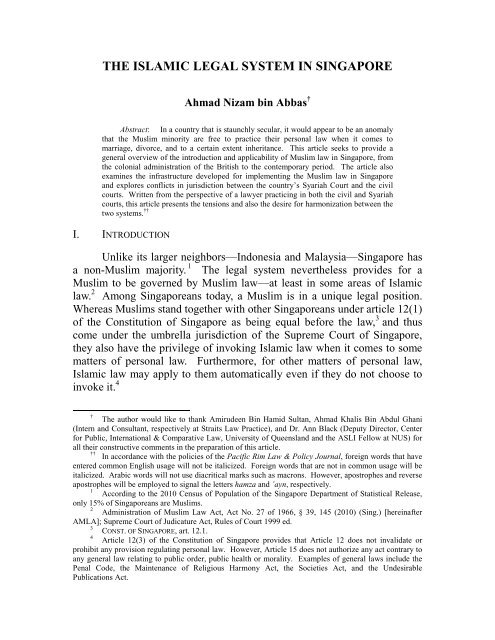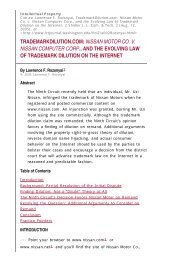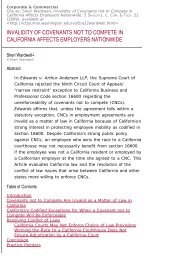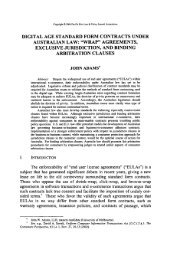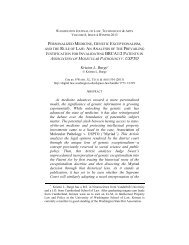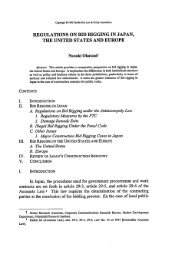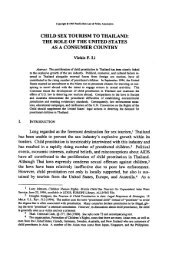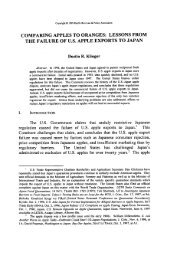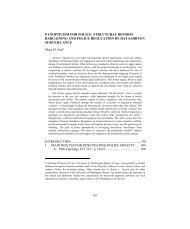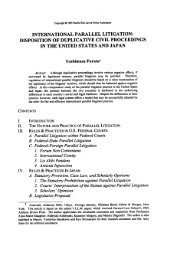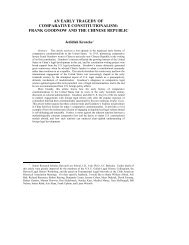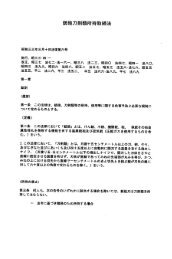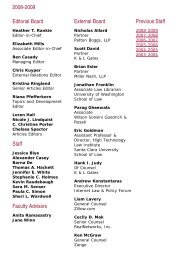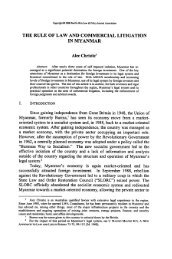the islamic legal system in singapore - University of Washington
the islamic legal system in singapore - University of Washington
the islamic legal system in singapore - University of Washington
You also want an ePaper? Increase the reach of your titles
YUMPU automatically turns print PDFs into web optimized ePapers that Google loves.
THE ISLAMIC LEGAL SYSTEM IN SINGAPORE<br />
Ahmad Nizam b<strong>in</strong> Abbas †<br />
Abstract: In a country that is staunchly secular, it would appear to be an anomaly<br />
that <strong>the</strong> Muslim m<strong>in</strong>ority are free to practice <strong>the</strong>ir personal law when it comes to<br />
marriage, divorce, and to a certa<strong>in</strong> extent <strong>in</strong>heritance. This article seeks to provide a<br />
general overview <strong>of</strong> <strong>the</strong> <strong>in</strong>troduction and applicability <strong>of</strong> Muslim law <strong>in</strong> S<strong>in</strong>gapore, from<br />
<strong>the</strong> colonial adm<strong>in</strong>istration <strong>of</strong> <strong>the</strong> British to <strong>the</strong> contemporary period. The article also<br />
exam<strong>in</strong>es <strong>the</strong> <strong>in</strong>frastructure developed for implement<strong>in</strong>g <strong>the</strong> Muslim law <strong>in</strong> S<strong>in</strong>gapore<br />
and explores conflicts <strong>in</strong> jurisdiction between <strong>the</strong> country’s Syariah Court and <strong>the</strong> civil<br />
courts. Written from <strong>the</strong> perspective <strong>of</strong> a lawyer practic<strong>in</strong>g <strong>in</strong> both <strong>the</strong> civil and Syariah<br />
courts, this article presents <strong>the</strong> tensions and also <strong>the</strong> desire for harmonization between <strong>the</strong><br />
two <strong>system</strong>s. ††<br />
I. INTRODUCTION<br />
Unlike its larger neighbors—Indonesia and Malaysia—S<strong>in</strong>gapore has<br />
a non-Muslim majority. 1 The <strong>legal</strong> <strong>system</strong> never<strong>the</strong>less provides for a<br />
Muslim to be governed by Muslim law—at least <strong>in</strong> some areas <strong>of</strong> Islamic<br />
law. 2 Among S<strong>in</strong>gaporeans today, a Muslim is <strong>in</strong> a unique <strong>legal</strong> position.<br />
Whereas Muslims stand toge<strong>the</strong>r with o<strong>the</strong>r S<strong>in</strong>gaporeans under article 12(1)<br />
<strong>of</strong> <strong>the</strong> Constitution <strong>of</strong> S<strong>in</strong>gapore as be<strong>in</strong>g equal before <strong>the</strong> law, 3 and thus<br />
come under <strong>the</strong> umbrella jurisdiction <strong>of</strong> <strong>the</strong> Supreme Court <strong>of</strong> S<strong>in</strong>gapore,<br />
<strong>the</strong>y also have <strong>the</strong> privilege <strong>of</strong> <strong>in</strong>vok<strong>in</strong>g Islamic law when it comes to some<br />
matters <strong>of</strong> personal law. Fur<strong>the</strong>rmore, for o<strong>the</strong>r matters <strong>of</strong> personal law,<br />
Islamic law may apply to <strong>the</strong>m automatically even if <strong>the</strong>y do not choose to<br />
<strong>in</strong>voke it. 4<br />
†<br />
The author would like to thank Amirudeen B<strong>in</strong> Hamid Sultan, Ahmad Khalis B<strong>in</strong> Abdul Ghani<br />
(Intern and Consultant, respectively at Straits Law Practice), and Dr. Ann Black (Deputy Director, Center<br />
for Public, International & Comparative Law, <strong>University</strong> <strong>of</strong> Queensland and <strong>the</strong> ASLI Fellow at NUS) for<br />
all <strong>the</strong>ir constructive comments <strong>in</strong> <strong>the</strong> preparation <strong>of</strong> this article.<br />
††<br />
In accordance with <strong>the</strong> policies <strong>of</strong> <strong>the</strong> Pacific Rim Law & Policy Journal, foreign words that have<br />
entered common English usage will not be italicized. Foreign words that are not <strong>in</strong> common usage will be<br />
italicized. Arabic words will not use diacritical marks such as macrons. However, apostrophes and reverse<br />
apostrophes will be employed to signal <strong>the</strong> letters hamza and ‛ayn, respectively.<br />
1<br />
Accord<strong>in</strong>g to <strong>the</strong> 2010 Census <strong>of</strong> Population <strong>of</strong> <strong>the</strong> S<strong>in</strong>gapore Department <strong>of</strong> Statistical Release,<br />
only 15% <strong>of</strong> S<strong>in</strong>gaporeans are Muslims.<br />
2<br />
Adm<strong>in</strong>istration <strong>of</strong> Muslim Law Act, Act No. 27 <strong>of</strong> 1966, § 39, 145 (2010) (S<strong>in</strong>g.) [here<strong>in</strong>after<br />
AMLA]; Supreme Court <strong>of</strong> Judicature Act, Rules <strong>of</strong> Court 1999 ed.<br />
3<br />
CONST. OF SINGAPORE, art. 12.1.<br />
4<br />
Article 12(3) <strong>of</strong> <strong>the</strong> Constitution <strong>of</strong> S<strong>in</strong>gapore provides that Article 12 does not <strong>in</strong>validate or<br />
prohibit any provision regulat<strong>in</strong>g personal law. However, Article 15 does not authorize any act contrary to<br />
any general law relat<strong>in</strong>g to public order, public health or morality. Examples <strong>of</strong> general laws <strong>in</strong>clude <strong>the</strong><br />
Penal Code, <strong>the</strong> Ma<strong>in</strong>tenance <strong>of</strong> Religious Harmony Act, <strong>the</strong> Societies Act, and <strong>the</strong> Undesirable<br />
Publications Act.
164 PACIFIC RIM LAW & POLICY JOURNAL VOL. 21 NO. 1<br />
II.<br />
THE EVOLVING ROLE OF ISLAMIC LAW IN SINGAPORE<br />
The roots <strong>of</strong> S<strong>in</strong>gapore’s plural <strong>legal</strong> <strong>system</strong> can be traced back to<br />
when S<strong>in</strong>gapore was a British colony. 5 Until 1880, <strong>the</strong> British embraced a<br />
policy <strong>of</strong> laissez-faire with respect to Muslim ritual and Muslim personal<br />
law <strong>in</strong> S<strong>in</strong>gapore. 6 This was encapsulated <strong>in</strong> a set <strong>of</strong> rules promulgated by<br />
Sir Stamford Raffles <strong>in</strong> 1823 before he left S<strong>in</strong>gapore: “In all cases<br />
regard<strong>in</strong>g <strong>the</strong> ceremonies <strong>of</strong> religion and marriages and <strong>the</strong> rules <strong>of</strong><br />
<strong>in</strong>heritance, <strong>the</strong> laws and custom <strong>of</strong> <strong>the</strong> Malays will be respected, where <strong>the</strong>y<br />
shall not be <strong>in</strong> contrary to reason, justice or humanity.” 7 In keep<strong>in</strong>g with this<br />
general pr<strong>in</strong>ciple, <strong>the</strong> Second Charter <strong>of</strong> Justice <strong>of</strong> 1826 conta<strong>in</strong>ed a caveat<br />
that, while English Law was to be applied <strong>in</strong> S<strong>in</strong>gapore, it could be modified<br />
to suit <strong>the</strong> religious beliefs and customs <strong>of</strong> <strong>the</strong> local <strong>in</strong>habitants. 8<br />
Over <strong>the</strong> n<strong>in</strong>eteenth and twentieth centuries, laws govern<strong>in</strong>g Muslims<br />
<strong>in</strong> S<strong>in</strong>gapore and <strong>the</strong> Straits Settlements more broadly developed out <strong>of</strong> a<br />
complex comb<strong>in</strong>ation <strong>of</strong> judicial precedent and statutory <strong>in</strong>tervention. 9<br />
Hawah v. Daud is <strong>the</strong> earliest reported judicial decision <strong>in</strong> which a court<br />
refused to apply British common law to Muslims <strong>in</strong> S<strong>in</strong>gapore and <strong>in</strong>stead<br />
applied what that court understood to be “Islamic law.” 10 In this case, <strong>the</strong><br />
Court <strong>of</strong> Judicature <strong>of</strong> Pr<strong>in</strong>ce <strong>of</strong> Wales Island, S<strong>in</strong>gapore and Malacca<br />
modified <strong>the</strong> English common law rule under which a woman’s property<br />
automatically became her husband’s upon marriage, as she no longer<br />
possessed capacity to hold property, thus allow<strong>in</strong>g Muslim women to reta<strong>in</strong><br />
<strong>the</strong> capacity <strong>of</strong> hold<strong>in</strong>g property <strong>in</strong> <strong>the</strong>ir own names upon marriage as well<br />
as entitl<strong>in</strong>g <strong>the</strong>m to a share <strong>of</strong> property <strong>in</strong> <strong>the</strong> event <strong>of</strong> divorce. 11<br />
The subsequent enactment <strong>of</strong> <strong>the</strong> 1880 Mahomedan Marriage<br />
Ord<strong>in</strong>ance <strong>in</strong> S<strong>in</strong>gapore was a landmark <strong>in</strong> that “for <strong>the</strong> first time, <strong>the</strong> British<br />
5<br />
The Second Charter <strong>of</strong> Justice was issued by <strong>the</strong> Crown on November 27, 1826 (extend<strong>in</strong>g <strong>the</strong><br />
jurisdiction <strong>of</strong> <strong>the</strong> Court <strong>of</strong> Judicature <strong>of</strong> Pr<strong>in</strong>ce <strong>of</strong> Wales’ Island to <strong>the</strong> two o<strong>the</strong>r territories <strong>of</strong> <strong>the</strong> Straits<br />
Settlements, S<strong>in</strong>gapore and Malacca). While English law was adopted as <strong>the</strong> basic law relat<strong>in</strong>g to<br />
marriages <strong>in</strong> S<strong>in</strong>gapore, a caveat was <strong>in</strong>cluded allow<strong>in</strong>g for <strong>the</strong> development <strong>of</strong> personal law based on<br />
religious beliefs and customs <strong>of</strong> <strong>the</strong> local <strong>in</strong>habitants—H<strong>in</strong>dus, Jews, and Muslims.<br />
6<br />
The Straits Settlements Mahomedan Marriage Ord<strong>in</strong>ance, enacted <strong>in</strong> 1880, was <strong>the</strong> earliest statute<br />
<strong>in</strong> Muslim law <strong>in</strong> S<strong>in</strong>gapore.<br />
7<br />
MOSHE YEGAR, ISLAM AND ISLAMIC INSTITUTIONS IN BRITISH MALAYA: POLICIES AND<br />
IMPLEMENTATION (1979).<br />
8<br />
HALSBURY’S LAWS OF SINGAPORE: FAMILY LAW 12 (2006).<br />
9<br />
For more on <strong>the</strong>se historical developments, see M.B. HOOKER, ISLAMIC LAW IN SOUTH-EAST ASIA<br />
84-122 (1984).<br />
10<br />
(1868) SLR Leic 253. In this case, which was heard <strong>in</strong> 1865, <strong>the</strong> husband had taken possession <strong>of</strong><br />
<strong>the</strong> title deeds <strong>of</strong> <strong>the</strong> wife’s property and <strong>the</strong>n divorced her under Muslim law. Id. She sued him for <strong>the</strong><br />
recovery <strong>of</strong> her property. Under <strong>the</strong> <strong>the</strong>n prevail<strong>in</strong>g common law, <strong>the</strong> husband became entitled to all his<br />
wife’s property upon marriage. Id.<br />
11<br />
HALSBURY’S LAWS OF SINGAPORE, supra note 8.
JANUARY 2012 THE ISLAMIC LEGAL SYSTEM IN SINGAPORE 165<br />
colonial authorities <strong>of</strong>ficially recognized, through legislation, <strong>the</strong> status <strong>of</strong><br />
Muslim personal law with<strong>in</strong> <strong>the</strong> colony.” 12 This Ord<strong>in</strong>ance formally<br />
provided for <strong>the</strong> registration <strong>of</strong> Muslim marriages and divorces and<br />
explicitly empowered <strong>the</strong> Governor <strong>of</strong> S<strong>in</strong>gapore to appo<strong>in</strong>t kathis or kadis<br />
(qadis or Islamic judges) to facilitate <strong>the</strong> adm<strong>in</strong>istration <strong>of</strong> Islam. 13<br />
Important amendments were made to <strong>the</strong> Ord<strong>in</strong>ance <strong>in</strong> 1908, 1923, and<br />
1957—<strong>the</strong> last <strong>of</strong> which provided for <strong>the</strong> establishment <strong>of</strong> a separate<br />
Syariah 14 Court <strong>of</strong> S<strong>in</strong>gapore. 15<br />
When S<strong>in</strong>gapore became an <strong>in</strong>dependent nation <strong>in</strong> 1965, it thus<br />
<strong>in</strong>herited a particular mode <strong>of</strong> <strong>in</strong>tegrat<strong>in</strong>g Islamic law <strong>in</strong>to <strong>the</strong> law <strong>of</strong> <strong>the</strong><br />
state—and <strong>of</strong> apply<strong>in</strong>g it to its Muslim population. 16 It had <strong>the</strong> opportunity,<br />
however, to fur<strong>the</strong>r evolve its method <strong>of</strong> regulat<strong>in</strong>g Muslim affairs and<br />
family law <strong>in</strong> a manner that was appropriate to S<strong>in</strong>gapore’s new situation.<br />
Article 153 <strong>of</strong> <strong>the</strong> S<strong>in</strong>gapore Constitution provides that “<strong>the</strong> Legislature<br />
shall, by law, make provision for regulat<strong>in</strong>g Muslim religious affairs and for<br />
constitut<strong>in</strong>g a Council to advise <strong>the</strong> President [<strong>of</strong> S<strong>in</strong>gapore] <strong>in</strong> matters<br />
relat<strong>in</strong>g to <strong>the</strong> Muslim religion.” 17<br />
III.<br />
THE ISLAMIC LEGAL SYSTEM IN CONTEMPORARY SINGAPORE<br />
The 1966 Adm<strong>in</strong>istration <strong>of</strong> Muslim Law Act (“AMLA”) is <strong>the</strong><br />
primary statute that sets out <strong>the</strong> provisions for regulat<strong>in</strong>g Muslim religious<br />
affairs and <strong>the</strong> framework <strong>of</strong> how Islamic law <strong>in</strong> S<strong>in</strong>gapore is applied. The<br />
AMLA was largely shaped by <strong>the</strong>n-Attorney General <strong>of</strong> S<strong>in</strong>gapore, <strong>the</strong> late<br />
pr<strong>of</strong>essor Dr. Ahmad Ibrahim. 18 Although Dr. Ibrahim had no formal<br />
tra<strong>in</strong><strong>in</strong>g <strong>in</strong> Islamic law (he graduated with first class honors <strong>in</strong> economics<br />
and law from Cambridge <strong>University</strong>), he wrote extensively about <strong>the</strong><br />
adm<strong>in</strong>istration <strong>of</strong> Muslim law <strong>in</strong> <strong>the</strong> region and significantly <strong>in</strong>fluenced its<br />
development.<br />
12<br />
TAUFIK ABDULLAH & SHARON SIDDIQUE, ISLAM AND SOCIETY IN SOUTHEAST ASIA (1986).<br />
13<br />
Mahommedan Marriage Ord<strong>in</strong>ance V <strong>of</strong> 1880.<br />
14<br />
“Syariah” is <strong>the</strong> local spell<strong>in</strong>g <strong>of</strong> “Shari‛a”.<br />
15<br />
HOOKER, supra note 9, at 99-101.<br />
16<br />
As stated <strong>in</strong> <strong>the</strong> <strong>of</strong>ficial website <strong>of</strong> <strong>the</strong> Syariah Court <strong>of</strong> S<strong>in</strong>gapore, <strong>the</strong> Syariah Court was <strong>the</strong><br />
fruition <strong>of</strong> a study by a select committee made up <strong>of</strong> lawyers, kadis, and local religious leaders. SYARIAH<br />
COURT SINGAPORE, http://app.syariahcourt.gov.sg/syariah/front-end/SYCHome_E.aspx (last visited Aug.<br />
11, 2011). The president and staff <strong>of</strong> <strong>the</strong> Syariah Court do not come under <strong>the</strong> purview <strong>of</strong> <strong>the</strong> S<strong>in</strong>gapore<br />
Legal Service but <strong>the</strong> M<strong>in</strong>istry <strong>of</strong> Community Development, Youth and Sports (which itself has evolved<br />
from <strong>the</strong> M<strong>in</strong>istry <strong>of</strong> Social Affairs). Id. After S<strong>in</strong>gapore’s <strong>in</strong>dependence, <strong>the</strong> government’s power to<br />
create a Syariah Court was conta<strong>in</strong>ed under Section 34 <strong>of</strong> <strong>the</strong> AMLA, whereby “<strong>the</strong> president <strong>of</strong> S<strong>in</strong>gapore<br />
may by notification <strong>in</strong> <strong>the</strong> Gazette constitute a Syariah Court for S<strong>in</strong>gapore.” AMLA, § 34.<br />
17<br />
Article 153 was <strong>in</strong>serted <strong>in</strong>to <strong>the</strong> Constitution <strong>in</strong> 1955 and has been <strong>the</strong>re ever s<strong>in</strong>ce, <strong>in</strong> spite <strong>of</strong><br />
S<strong>in</strong>gapore becom<strong>in</strong>g <strong>in</strong>dependent <strong>in</strong> 1965.<br />
18<br />
AHMAD IBRAHIM, FAMILY LAW IN MALAYSIA (3d ed. 1997).
166 PACIFIC RIM LAW & POLICY JOURNAL VOL. 21 NO. 1<br />
On <strong>the</strong> question <strong>of</strong> what substantive <strong>in</strong>terpretation <strong>of</strong> Islamic law <strong>the</strong><br />
courts should follow, <strong>the</strong> statute is largely silent. 19 In various clauses <strong>in</strong> <strong>the</strong><br />
AMLA, particularly those relat<strong>in</strong>g to marriage and divorces, one f<strong>in</strong>ds time<br />
and aga<strong>in</strong> <strong>the</strong> statement that <strong>the</strong> courts should rule “<strong>in</strong> accordance with<br />
Muslim law.” 20 There is no def<strong>in</strong>ition <strong>of</strong> Muslim law. 21 The ambiguity<br />
about where, precisely, “Muslim law” is to be found becomes more strik<strong>in</strong>g<br />
<strong>in</strong> those passages where AMLA’s requirement that judges resolve cases “<strong>in</strong><br />
accordance with Muslim law” is followed by <strong>the</strong> qualify<strong>in</strong>g phrase ‘‘and<br />
modified, where applicable, by Malay custom”. 22 The majority <strong>of</strong> Muslims<br />
<strong>in</strong> S<strong>in</strong>gapore are Sunni Muslims, who subscribe to <strong>the</strong> Shafi‛i (Malay:<br />
Syafi‛i) school <strong>of</strong> Islamic <strong>legal</strong> <strong>in</strong>terpretation (madhhab). 23 There is every<br />
reason to believe that <strong>the</strong> drafters <strong>of</strong> <strong>the</strong> AMLA expected <strong>the</strong> Syariah courts<br />
<strong>in</strong> <strong>in</strong>dependent S<strong>in</strong>gapore, for <strong>the</strong> most part, to follow Shafi‛i<br />
<strong>in</strong>terpretations. 24 However, it was probably <strong>in</strong>tentional that this was not<br />
spelled out, so as to allow for <strong>the</strong> possibility that <strong>the</strong> Syariah courts might<br />
choose <strong>in</strong> certa<strong>in</strong> circumstances to follow <strong>the</strong> lead <strong>of</strong> o<strong>the</strong>r schools <strong>of</strong><br />
<strong>in</strong>terpretation. 25<br />
In some areas, <strong>the</strong> AMLA specifies <strong>the</strong> actual substantive<br />
<strong>in</strong>terpretation <strong>of</strong> Islamic law that judges should follow. 26 In <strong>the</strong> section on<br />
judicial dissolution <strong>of</strong> marriage (faskh), for example, <strong>the</strong> AMLA specifies<br />
<strong>the</strong> acceptable grounds for dissolution. 27 Also, <strong>the</strong>re is a section sett<strong>in</strong>g forth<br />
<strong>the</strong> books or sources <strong>of</strong> law upon which a judge can rely <strong>in</strong> determ<strong>in</strong><strong>in</strong>g<br />
disputes on <strong>in</strong>heritance and succession. 28<br />
The AMLA sets out <strong>the</strong> powers and ambit <strong>of</strong> <strong>the</strong> key Muslim<br />
<strong>in</strong>stitutions <strong>in</strong> <strong>in</strong>dependent S<strong>in</strong>gapore <strong>in</strong> outl<strong>in</strong><strong>in</strong>g <strong>the</strong> structure and authority<br />
<strong>of</strong> three key Islamic <strong>in</strong>stitutions: <strong>the</strong> Islamic Religious Council (Majlis<br />
Ugama Islam S<strong>in</strong>gapura or “MUIS”), <strong>the</strong> Registry <strong>of</strong> Muslim Marriages<br />
19<br />
Id. at 10.<br />
20<br />
See, e.g., AMLA, § 52(2) (payment <strong>of</strong> a consolatory gift or mutaah upon divorce).<br />
21<br />
See generally AMLA.<br />
22<br />
See id. § 112 (distribution <strong>of</strong> <strong>the</strong> Muslim’s estate).<br />
23<br />
ISLAMIC FAMILY LAW IN A CHANGING WORLD: A GLOBAL RESOURCE BOOK 1, 5 (Abdullahi A<br />
An-Na’im ed. 2002).<br />
24<br />
AMLA, § 33 (specify<strong>in</strong>g that <strong>the</strong> authorities to be followed <strong>in</strong> issu<strong>in</strong>g any rul<strong>in</strong>g <strong>of</strong> <strong>the</strong> fatwa<br />
committee shall ord<strong>in</strong>arily follow <strong>the</strong> tenets <strong>of</strong> <strong>the</strong> Shafi‛i school <strong>of</strong> law).<br />
25<br />
Id. § 33(2) (provid<strong>in</strong>g that where <strong>the</strong> follow<strong>in</strong>g <strong>of</strong> <strong>the</strong> tenets <strong>the</strong> Shafi‛i school <strong>of</strong> law will be<br />
opposed to public <strong>in</strong>terest, tenets <strong>of</strong> any o<strong>the</strong>r accepted schools <strong>of</strong> Muslim law may be followed).<br />
26<br />
Id. § 49.<br />
27<br />
Id.<br />
28<br />
Id. § 114. Section 114 lists <strong>the</strong> texts 1) <strong>the</strong> English translation <strong>of</strong> <strong>the</strong> Quran by A. Yusuf Ali or<br />
Marmaduke Pickthall; 2) Mohammedan Law by Syed Ameer Ali; 3) M<strong>in</strong>haj et Talib<strong>in</strong> by Nawawi,<br />
translated by E. C. Howard from <strong>the</strong> French translation <strong>of</strong> Van den Berg; 4) Digest <strong>of</strong> Moohummudan Law<br />
by Neil B. E. Baillie; 5) Anglo-Muhammadan Law by Sir Roland Knyvet Wilson, 6th Edition Revised by A.<br />
Yusuf Ali; 6) Outl<strong>in</strong>es <strong>of</strong> Muhammadan Law by A. A. Fyzee; and 7) Muhammadan Law by F. B. Tyabji.
JANUARY 2012 THE ISLAMIC LEGAL SYSTEM IN SINGAPORE 167<br />
(“ROMM”), which adm<strong>in</strong>isters marriages under Muslim law, and <strong>the</strong><br />
Syariah court <strong>system</strong>. 29 Because <strong>the</strong> AMLA effectively establishes and<br />
def<strong>in</strong>es <strong>the</strong> powers <strong>of</strong> <strong>the</strong> <strong>in</strong>stitutions <strong>in</strong>volved <strong>in</strong> <strong>the</strong> adm<strong>in</strong>istration <strong>of</strong><br />
Islamic law <strong>in</strong> <strong>the</strong> country, 30 this article’s overview <strong>of</strong> <strong>the</strong> Islamic segments<br />
<strong>of</strong> S<strong>in</strong>gapore’s contemporary <strong>legal</strong> <strong>system</strong> will be structured accord<strong>in</strong>g to <strong>the</strong><br />
major sections <strong>of</strong> this legislation: MUIS, <strong>the</strong> Syariah Court, and ROMM.<br />
IV.<br />
MAJLIS UGAMA ISLAM SINGAPURA<br />
The Majlis Ugama Islam S<strong>in</strong>gapura (MUIS) was created to adm<strong>in</strong>ister<br />
<strong>the</strong> general religious life <strong>of</strong> Muslims and plays a number <strong>of</strong> important roles<br />
<strong>in</strong> establish<strong>in</strong>g and adm<strong>in</strong>ister<strong>in</strong>g rules to regulate Muslim life <strong>in</strong><br />
S<strong>in</strong>gapore. 31 The president <strong>of</strong> <strong>the</strong> MUIS is empowered to constitute <strong>the</strong><br />
Appeals Board that hears appeals from decisions <strong>of</strong> <strong>the</strong> Syariah courts. 32<br />
The MUIS has <strong>the</strong> power to issue <strong>legal</strong> rul<strong>in</strong>gs on questions <strong>of</strong> Islamic law<br />
(fatwas) that arise <strong>in</strong> cases under <strong>the</strong> jurisdiction <strong>of</strong> <strong>the</strong> civil court. 33<br />
The MUIS is comprised <strong>of</strong> a president, vice-president, mufti (Islamic<br />
<strong>legal</strong> scholar qualified to give <strong>legal</strong> op<strong>in</strong>ions), and a prescribed number <strong>of</strong><br />
o<strong>the</strong>rs appo<strong>in</strong>ted on <strong>the</strong> recommendation <strong>of</strong> <strong>the</strong> m<strong>in</strong>ister and from a list <strong>of</strong><br />
nom<strong>in</strong>ees by specific Muslim societies. 34 All Council members are<br />
appo<strong>in</strong>ted by <strong>the</strong> President <strong>of</strong> S<strong>in</strong>gapore and are deemed public servants for<br />
<strong>the</strong> purposes <strong>of</strong> <strong>the</strong> Penal Code. 35 It is a statutory requirement that a copy <strong>of</strong><br />
<strong>the</strong> m<strong>in</strong>utes <strong>of</strong> all meet<strong>in</strong>gs <strong>of</strong> <strong>the</strong> MUIS be sent to <strong>the</strong> President <strong>of</strong><br />
S<strong>in</strong>gapore. 36<br />
The AMLA lists <strong>the</strong> several roles and functions <strong>of</strong> <strong>the</strong> MUIS <strong>in</strong> <strong>the</strong><br />
adm<strong>in</strong>istration <strong>of</strong> matters relat<strong>in</strong>g to <strong>the</strong> Muslim religion and to <strong>the</strong> life <strong>of</strong><br />
Muslims <strong>in</strong> S<strong>in</strong>gapore, <strong>in</strong>clud<strong>in</strong>g <strong>the</strong> hajj, halal certification, identification<br />
<strong>of</strong> “false doctr<strong>in</strong>e,” 37 Muslim endowments (Ar: waqf; Malay: wakaf), zakat<br />
(obligatory charitable giv<strong>in</strong>g), and o<strong>the</strong>r charitable contributions for <strong>the</strong><br />
support and promotion <strong>of</strong> Islam and <strong>the</strong> Muslim community <strong>in</strong> S<strong>in</strong>gapore. 38<br />
29<br />
See AMLA, parts II-IV.<br />
30<br />
Id.<br />
31<br />
See AMLA, part II.<br />
32<br />
Id. § 55(4).<br />
33<br />
Id. § 32.<br />
34<br />
Id. § 7.<br />
35<br />
Id. §28.<br />
36<br />
Id. § 21(4).<br />
37<br />
Under <strong>the</strong> AMLA, where evidence is given by <strong>the</strong> president <strong>of</strong> <strong>the</strong> MUIS on any doctr<strong>in</strong>e,<br />
ceremony, or act that is contrary to <strong>the</strong> Muslim law, <strong>the</strong> court shall presume that such doctr<strong>in</strong>e, ceremony or<br />
act is contrary to <strong>the</strong> Muslim law. Although <strong>the</strong>re is no reported decision on whe<strong>the</strong>r this statutory<br />
presumption has ever been <strong>in</strong>voked, <strong>the</strong> emphatic tone is strik<strong>in</strong>g. AMLA, § 139(2).<br />
38<br />
AMLA, part IV.
168 PACIFIC RIM LAW & POLICY JOURNAL VOL. 21 NO. 1<br />
The MUIS does not have <strong>the</strong> power to impose f<strong>in</strong>es or commit anyone to<br />
prison for breaches under <strong>the</strong> AMLA. 39 It can, however, act with <strong>the</strong><br />
authority <strong>of</strong> a public prosecutor and commence cases <strong>in</strong> <strong>the</strong> crim<strong>in</strong>al courts.<br />
The MUIS has recently been given <strong>the</strong> power to <strong>in</strong>itiate prosecution not only<br />
<strong>of</strong> bus<strong>in</strong>ess entities that violate its regulations but also <strong>of</strong> <strong>the</strong> <strong>of</strong>ficers <strong>of</strong><br />
those companies. 40<br />
A. Regulation <strong>of</strong> Religious Foundations (Wakaf)<br />
The MUIS is charged with manag<strong>in</strong>g wakaf land: trust property that<br />
has been dedicated for pious, religious, and charitable purposes under<br />
Muslim law. 41 All wakaf property located <strong>in</strong> S<strong>in</strong>gapore automatically vests<br />
<strong>in</strong> <strong>the</strong> MUIS and may not be conveyed, assigned, or transferred. 42 The 1999<br />
amendments to <strong>the</strong> AMLA have <strong>in</strong>creased <strong>the</strong> efficiency <strong>of</strong> wakaf<br />
adm<strong>in</strong>istration as it became mandatory henceforth 43 for all wakaf land to be<br />
registered with <strong>the</strong> MUIS. 44 Failure to comply with <strong>the</strong> registration<br />
requirement constitutes an <strong>of</strong>fence punishable with a f<strong>in</strong>e or imprisonment<br />
or both. 45 This change was welcom<strong>in</strong>g news for conveyancers who can now<br />
ascerta<strong>in</strong> <strong>the</strong> status <strong>of</strong> a property by search<strong>in</strong>g <strong>the</strong> registry <strong>of</strong> wakafs. It has<br />
also recently been made clear that <strong>the</strong> MUIS has significant power to<br />
appo<strong>in</strong>t, supervise and, if necessary, remove <strong>the</strong> adm<strong>in</strong>istrators <strong>of</strong> wakafs. 46<br />
Although <strong>the</strong> MUIS regulates wakafs and occasionally <strong>in</strong>tervenes <strong>in</strong><br />
<strong>the</strong>ir adm<strong>in</strong>istration to ensure compliance with <strong>the</strong> law, disputes over wakaf<br />
property must be adjudicated <strong>in</strong> <strong>the</strong> civil courts, which are thus placed <strong>in</strong> <strong>the</strong><br />
39<br />
See AMLA.<br />
40<br />
AMLA, § 88D.<br />
41<br />
Id. § 59.<br />
42<br />
Id.<br />
43<br />
This applies to every wakaf created retrospectively (i.e., even before <strong>the</strong> July 1, 1968 AMLA<br />
§ 64(1)).<br />
44<br />
AMLA, §64.<br />
45<br />
Id. § 64(11).<br />
46<br />
In Syed Abbas b<strong>in</strong> Mohamed Alsag<strong>of</strong>f and Ano<strong>the</strong>r v. Islamic Religious Council <strong>of</strong> S<strong>in</strong>gapore,<br />
[2009] SGHC 281, <strong>the</strong> high court clarified that Sections 58(4) and (5) <strong>of</strong> <strong>the</strong> AMLA confer power on <strong>the</strong><br />
MUIS to appo<strong>in</strong>t and remove those entrusted with adm<strong>in</strong>ister<strong>in</strong>g a wakaf (“mutawalli”) and to remove<br />
exist<strong>in</strong>g trustees from a wakaf. Indeed, as long as it appears to <strong>the</strong> MUIS that any wakaf or endowment has<br />
been mismanaged, <strong>the</strong>re are no trustees appo<strong>in</strong>ted to <strong>the</strong> management <strong>of</strong> <strong>the</strong> wakaf or endowment, or it<br />
would be o<strong>the</strong>rwise to <strong>the</strong> advantage <strong>of</strong> <strong>the</strong> wakaf or endowment to appo<strong>in</strong>t a mutawalli, MUIS does not<br />
require a court order to take such actions. The relevant provisions read “[t]he trustees <strong>of</strong> <strong>the</strong> wakaf or<br />
endowment appo<strong>in</strong>ted under <strong>the</strong> <strong>in</strong>strument creat<strong>in</strong>g, govern<strong>in</strong>g or affect<strong>in</strong>g <strong>the</strong> same shall, subject to <strong>the</strong><br />
provisions <strong>of</strong> this Act, manage <strong>the</strong> wakaf or endowment but <strong>the</strong> Majlis shall have power to appo<strong>in</strong>t<br />
mutawallis, and for such purpose to remove any exist<strong>in</strong>g trustees . . . . The Majlis may at any time remove<br />
any mutawalli appo<strong>in</strong>ted by it and appo<strong>in</strong>t ano<strong>the</strong>r <strong>in</strong> his place.” AMLA, § 58.
JANUARY 2012 THE ISLAMIC LEGAL SYSTEM IN SINGAPORE 169<br />
position <strong>of</strong> hav<strong>in</strong>g to <strong>in</strong>terpret Muslim law. 47 As we shall discuss below,<br />
civil courts adjudicat<strong>in</strong>g <strong>the</strong>se cases may request an op<strong>in</strong>ion by <strong>the</strong> MUIS on<br />
questions <strong>of</strong> Muslim law, but <strong>the</strong> courts are not obliged to follow an op<strong>in</strong>ion<br />
by <strong>the</strong> MUIS and <strong>in</strong>deed <strong>the</strong>y sometimes choose not to <strong>in</strong> practice.<br />
B. The MUIS Fatwa Committee<br />
The MUIS has been entrusted with <strong>the</strong> responsibility to advise<br />
S<strong>in</strong>gaporeans on questions <strong>of</strong> Muslim law. 48 Section 31 <strong>of</strong> <strong>the</strong> AMLA<br />
provides for <strong>the</strong> creation with<strong>in</strong> <strong>the</strong> MUIS <strong>of</strong> a Fatwa Committee (or Legal<br />
Committee) consist<strong>in</strong>g <strong>of</strong> an <strong>of</strong>ficial Mufti, two fit and proper members <strong>of</strong><br />
<strong>the</strong> MUIS Council, and not more than two o<strong>the</strong>r fit and proper Muslims who<br />
are not MUIS members. 49 The Mufti is appo<strong>in</strong>ted by <strong>the</strong> President <strong>of</strong><br />
S<strong>in</strong>gapore. 50 As <strong>the</strong> chairman <strong>of</strong> <strong>the</strong> Fatwa Committee and by his mandatory<br />
<strong>in</strong>clusion <strong>in</strong> <strong>the</strong> MUIS Council, <strong>the</strong> Mufti plays a highly <strong>in</strong>fluential role <strong>in</strong><br />
provid<strong>in</strong>g guidance on matters touch<strong>in</strong>g on <strong>the</strong> religious life <strong>of</strong> Muslims <strong>in</strong><br />
S<strong>in</strong>gapore. 51 The Mufti is supported by a staff located <strong>in</strong> <strong>the</strong> Office <strong>of</strong> <strong>the</strong><br />
Mufti. 52 Ord<strong>in</strong>arily, <strong>the</strong> Fatwa Committee follows <strong>the</strong> tenets <strong>of</strong> <strong>the</strong> Shafi‛i<br />
school <strong>of</strong> law <strong>in</strong> issu<strong>in</strong>g any rul<strong>in</strong>g, 53 but it can depart from this and follow<br />
<strong>the</strong> tenets <strong>of</strong> any <strong>of</strong> <strong>the</strong> accepted schools <strong>of</strong> Muslim law “if <strong>the</strong> Fatwa<br />
Committee considers that <strong>the</strong> follow<strong>in</strong>g <strong>of</strong> <strong>the</strong> tenets <strong>of</strong> <strong>the</strong> Shafi‛i School <strong>of</strong><br />
Law will be opposed to <strong>the</strong> public <strong>in</strong>terest.” 54 This is a curious piece <strong>of</strong><br />
legislation, and its existence is probably attributable to <strong>the</strong> period when <strong>the</strong><br />
members <strong>of</strong> <strong>the</strong> old Mohameddan Advisory Board were from all four<br />
schools <strong>of</strong> thought. A comprehensive, though not exhaustive, list <strong>of</strong> fatwas<br />
can be found on <strong>the</strong> MUIS website. 55<br />
47<br />
See, e.g., Abdul Rahman b<strong>in</strong> Mohamed Yunoos and Anor v. Majlis Ugama Islam S<strong>in</strong>gapura<br />
[1995] 2 SLR 705.<br />
48<br />
AMLA, § sec. 3.<br />
49<br />
Prior to <strong>the</strong> 2009 amendments to <strong>the</strong> AMLA, it was required that <strong>the</strong> chairman <strong>of</strong> <strong>the</strong> Fatwa<br />
Committee be <strong>the</strong> Mufti himself. The law has now been amended so that <strong>the</strong> Mufti may recuse himself<br />
from <strong>the</strong> Fatwa Committee <strong>in</strong> situations where he has a conflict <strong>of</strong> <strong>in</strong>terest. As succ<strong>in</strong>ctly expla<strong>in</strong>ed by Dr.<br />
Yaacob Ibrahim, fatwas are made <strong>in</strong> <strong>the</strong> name <strong>of</strong> <strong>the</strong> MUIS, not <strong>the</strong> Mufti, and thus, where appropriate, it<br />
need not necessarily be <strong>the</strong> Mufti himself who appears <strong>in</strong> court when an op<strong>in</strong>ion or evidence on Muslim<br />
law is required. See Hansard record <strong>of</strong> Parliament sitt<strong>in</strong>g on Nov. 17, 2008 on <strong>the</strong> AMLA (Amendment)<br />
Bill, Second Read<strong>in</strong>g.<br />
50<br />
AMLA, §30.<br />
51<br />
Id. § 31.<br />
52<br />
Id.<br />
53<br />
Id. § 33(1).<br />
54<br />
Id. § 33.<br />
55<br />
MAJLIS UGAMA ISLAM SINGAPURA (ISLAMIC RELIGIOUS COUNCIL OF SINGAPORE),<br />
www.muis.gov.sg (last visited Sept. 11, 2011).
170 PACIFIC RIM LAW & POLICY JOURNAL VOL. 21 NO. 1<br />
Upon request, <strong>the</strong> Fatwa Committee can issue a fatwa on any po<strong>in</strong>t <strong>of</strong><br />
Muslim law. 56 Any member <strong>of</strong> <strong>the</strong> public can request an op<strong>in</strong>ion from <strong>the</strong><br />
Fatwa Committee, but <strong>the</strong> Committee is not bound to respond to every<br />
request and thus naturally gives priority to questions <strong>of</strong> public <strong>in</strong>terest. 57<br />
Lawyers frequently solicit op<strong>in</strong>ions on behalf <strong>of</strong> <strong>the</strong>ir clients on issues <strong>of</strong><br />
personal status, e.g., <strong>the</strong> validity <strong>of</strong> a marriage conducted outside S<strong>in</strong>gapore,<br />
<strong>in</strong>heritance, legitimacy <strong>of</strong> children, and adoption issues. Any court is<br />
permitted to ask <strong>the</strong> MUIS for an op<strong>in</strong>ion if a case before <strong>the</strong> court raises a<br />
question <strong>of</strong> Muslim law. 58 Upon receipt <strong>of</strong> such a request, <strong>the</strong> MUIS refers<br />
<strong>the</strong> question to <strong>the</strong> Fatwa Committee for an op<strong>in</strong>ion. 59 F<strong>in</strong>ally, <strong>the</strong> Fatwa<br />
Committee may issue a fatwa on its own volition if it identifies an issue that<br />
it feels needs to be addressed. 60<br />
If a judge on <strong>the</strong> Syariah Court asks <strong>the</strong> MUIS for an op<strong>in</strong>ion, one can<br />
reasonably expect <strong>the</strong> judge to follow <strong>the</strong> op<strong>in</strong>ion—if only because, as we<br />
have noted, appeals from decisions <strong>in</strong> <strong>the</strong> Syariah Court go to an Appeals<br />
Board constituted by <strong>the</strong> MUIS president. 61 A more <strong>in</strong>terest<strong>in</strong>g question<br />
<strong>in</strong>volves <strong>the</strong> treatment <strong>of</strong> MUIS fatwas by <strong>the</strong> civil courts. Civil courts,<br />
when faced with a question <strong>of</strong> Muslim law, are not obliged to seek an<br />
op<strong>in</strong>ion from <strong>the</strong> MUIS. 62 They may do so, however, and litigants may also<br />
56<br />
57<br />
AMLA, § 32.<br />
Id. § 32(1).<br />
58<br />
Id. § 32(7).<br />
59<br />
Id.<br />
60<br />
Id. § 32(6).<br />
61<br />
Id. § 55. Fur<strong>the</strong>r, members <strong>of</strong> <strong>the</strong> Appeal Board are nom<strong>in</strong>ated by <strong>the</strong> MUIS, <strong>of</strong> which <strong>the</strong> Mufti<br />
is a member. Any Syariah court decision contrary to a fatwa is likely to be overruled on appeal. In<br />
Za<strong>in</strong>ud<strong>in</strong> B<strong>in</strong> Mohamad v. <strong>the</strong> Registrar <strong>of</strong> Muslim Marriages (Appeal Case No. 19/1997), <strong>the</strong> Appeal<br />
Board stated that s<strong>in</strong>ce even <strong>the</strong> President <strong>of</strong> S<strong>in</strong>gapore is statutorily required to seek <strong>the</strong> advice <strong>of</strong> <strong>the</strong><br />
MUIS <strong>in</strong> respect to <strong>legal</strong> issues under Islamic law, <strong>the</strong> Registrar <strong>of</strong> Muslim Marriages has more reason to<br />
respect and take <strong>in</strong>to consideration <strong>the</strong> fatwas from <strong>the</strong> Islamic po<strong>in</strong>t <strong>of</strong> view.<br />
62<br />
As Muslim law is part <strong>of</strong> <strong>the</strong> law <strong>of</strong> <strong>the</strong> land, civil courts have <strong>the</strong> power to <strong>in</strong>terpret <strong>the</strong> law on<br />
<strong>the</strong>ir own. Alternatively <strong>the</strong>y have, <strong>in</strong> at least one case, allowed parties to agree upon an <strong>in</strong>terpretation <strong>of</strong><br />
Islamic law that would resolve <strong>the</strong>ir dispute. In Shiraz Abidally Husa<strong>in</strong> and Ano<strong>the</strong>r v. Husa<strong>in</strong> Safdar<br />
Abidally, <strong>the</strong> court assured itself that this agreed position represented one <strong>of</strong> <strong>the</strong> legitimate compet<strong>in</strong>g<br />
<strong>in</strong>terpretations <strong>of</strong> Islamic law. It <strong>the</strong>n applied that position, without ask<strong>in</strong>g <strong>the</strong> MUIS for an op<strong>in</strong>ion that<br />
might lead to a contrary op<strong>in</strong>ion. The Court <strong>of</strong> Appeal, <strong>the</strong> highest judicial authority <strong>in</strong> S<strong>in</strong>gapore, was<br />
faced with a case <strong>in</strong>volv<strong>in</strong>g <strong>the</strong> distribution <strong>of</strong> a deceased Muslim’s monies amongst his children. One<br />
party wanted <strong>the</strong> Court to nullify an agreement by all <strong>the</strong> children for <strong>the</strong> monies to be divided equally,<br />
whe<strong>the</strong>r son or daughter. At <strong>the</strong> hear<strong>in</strong>g below, High Court Judge Kan T<strong>in</strong>g Chiu had preceded <strong>the</strong><br />
exam<strong>in</strong>ation <strong>of</strong> <strong>the</strong> facts by <strong>in</strong>vit<strong>in</strong>g <strong>the</strong> parties to commit to an agreed position on <strong>the</strong> various aspects <strong>of</strong><br />
Islamic law <strong>of</strong> <strong>in</strong>heritance. The Court <strong>of</strong> Appeal adopted a similarly cautious position: “we concluded that<br />
<strong>the</strong>re was an agreement among <strong>the</strong> six children on [May 28, 2003] to distribute to <strong>the</strong>mselves equally<br />
regardless <strong>of</strong> <strong>the</strong> quantum <strong>of</strong> moneys rema<strong>in</strong><strong>in</strong>g <strong>in</strong> <strong>the</strong> bank accounts after meet<strong>in</strong>g <strong>the</strong> payments <strong>of</strong> <strong>the</strong><br />
pecuniary legacies under <strong>the</strong> Will. Such an agreement was not <strong>in</strong>consistent with Muslim law and was<br />
b<strong>in</strong>d<strong>in</strong>g on <strong>the</strong>m.” Shiraz Abidally Husa<strong>in</strong> and Ano<strong>the</strong>r v. Husa<strong>in</strong> Safdar Abidally, [2007] SGCA 16.
JANUARY 2012 THE ISLAMIC LEGAL SYSTEM IN SINGAPORE 171<br />
<strong>in</strong>form <strong>the</strong> court about fatwas considered relevant to <strong>the</strong> dispute. The courts,<br />
however, are not bound to accept <strong>the</strong>m. 63<br />
While <strong>the</strong> high court has not followed <strong>the</strong> MUIS fatwas <strong>in</strong> all cases, it<br />
cannot be said that fatwas are nei<strong>the</strong>r useful nor effective <strong>in</strong> civil litigation.<br />
Civil courts do generally abide by <strong>the</strong> MUIS’s rul<strong>in</strong>gs, although, as <strong>the</strong>se<br />
cases have shown, courts may resist where <strong>the</strong>y f<strong>in</strong>d that <strong>the</strong> rul<strong>in</strong>g<br />
contradicts statute or an established pr<strong>in</strong>ciple <strong>of</strong> civil law, or rule <strong>in</strong> favor <strong>of</strong><br />
ano<strong>the</strong>r <strong>in</strong>terpretation <strong>of</strong> Muslim law that is applicable to <strong>the</strong> case. 64<br />
Interest<strong>in</strong>gly, on at least one occasion, <strong>the</strong> MUIS modified its <strong>in</strong>terpretation<br />
<strong>of</strong> Muslim law by align<strong>in</strong>g it more closely to civil law practice so as to<br />
reduce <strong>the</strong> difficulty faced by <strong>the</strong> Muslim public aris<strong>in</strong>g from conflict <strong>of</strong> law<br />
issues. 65<br />
V. THE SYARIAH COURT<br />
The AMLA also establishes and regulates S<strong>in</strong>gapore’s Syariah<br />
Court. 66 In Norhamisah Haroon, <strong>the</strong> <strong>the</strong>n-Registrar summed up <strong>the</strong> ambit <strong>of</strong><br />
<strong>the</strong> Syariah Court as follows: “[t]he Syariah Court is a creature <strong>of</strong> statute. It<br />
derives its jurisdiction and power under <strong>the</strong> AMLA. Any jurisdiction or<br />
power that it purports to possess must be expressly provided <strong>in</strong> [<strong>the</strong>]<br />
AMLA.” 67 Appeals from <strong>the</strong> Syariah Court are taken to an Appeals Board<br />
supervised by <strong>the</strong> MUIS, which will be discussed below.<br />
63<br />
For example, <strong>in</strong> Saniah B<strong>in</strong>te Ali and O<strong>the</strong>rs v. Abdullah B<strong>in</strong> Ali, a case <strong>in</strong>volv<strong>in</strong>g a dispute over<br />
<strong>the</strong> distribution <strong>of</strong> retirement funds held by <strong>the</strong> state, High Court Justice L.P. Thean declared that while <strong>the</strong><br />
court respected <strong>the</strong> op<strong>in</strong>ion <strong>of</strong> <strong>the</strong> Fatwa Committee bear<strong>in</strong>g on <strong>the</strong> issue, it was not absolutely bound to it.<br />
[1990] 1 SLR(R) 555. In a 2004 case <strong>in</strong>volv<strong>in</strong>g a dispute over <strong>the</strong> nuzriah (letter <strong>of</strong> wishes) <strong>of</strong> <strong>the</strong><br />
deceased, <strong>the</strong> high court went even fur<strong>the</strong>r and exam<strong>in</strong>ed <strong>the</strong> manner <strong>in</strong> which <strong>the</strong> Fatwa Committee made<br />
its rul<strong>in</strong>g. In Mohamed Ismail b<strong>in</strong> Ibrahim and Ano<strong>the</strong>r v. Mohammad Taha b<strong>in</strong> Ibrahim, Justice Rub<strong>in</strong><br />
stated that he had <strong>the</strong> “highest regard” for <strong>the</strong> Fatwa Committee, but did not consider <strong>the</strong> high court bound<br />
to follow its rul<strong>in</strong>g. [2004] 4 SLR(R) 756.<br />
64<br />
Shafeeg B<strong>in</strong> Salim Talib and Ano<strong>the</strong>r v. Fatimah Bte Abud B<strong>in</strong> Talib and O<strong>the</strong>rs [2009] SGHC<br />
100. The issue concerned <strong>the</strong> civil law doctr<strong>in</strong>e <strong>of</strong> jo<strong>in</strong>t tenancy, a form <strong>of</strong> property ownership where<strong>in</strong> <strong>the</strong><br />
death <strong>of</strong> one <strong>of</strong> <strong>the</strong> jo<strong>in</strong>t tenants results <strong>in</strong> <strong>the</strong> share <strong>of</strong> <strong>the</strong> deceased tenant automatically pass<strong>in</strong>g to <strong>the</strong><br />
surviv<strong>in</strong>g tenant. In this case, Justice Lee Sieu K<strong>in</strong> decl<strong>in</strong>ed to follow an older MUIS fatwa on <strong>the</strong> issue <strong>of</strong><br />
jo<strong>in</strong>t tenancy, stat<strong>in</strong>g that “half <strong>of</strong> <strong>the</strong> [property] is considered as <strong>in</strong>heritance and should be distributed<br />
accord<strong>in</strong>g to Islamic [i]nheritance law (faraidh ‛ilm al-faraid).” Id. Justice Lee held, <strong>in</strong>stead, that <strong>the</strong><br />
deceased’s <strong>in</strong>terest <strong>in</strong> <strong>the</strong> property had, upon his death, passed to <strong>the</strong> surviv<strong>in</strong>g jo<strong>in</strong>t tenant and was<br />
<strong>the</strong>refore not part <strong>of</strong> <strong>the</strong> estate. Id.<br />
65<br />
The decision <strong>in</strong> Shafeeg B<strong>in</strong> Salim Talib, [2009] SGHC 100, was followed by an announcement<br />
from MUIS that Muslims could bequeath <strong>the</strong>ir share <strong>of</strong> property owned under a jo<strong>in</strong>t tenancy, based on<br />
certa<strong>in</strong> criteria. In do<strong>in</strong>g this, <strong>the</strong> Fatwa Committee took great pa<strong>in</strong>s to expla<strong>in</strong> <strong>the</strong> rationale beh<strong>in</strong>d <strong>the</strong>ir<br />
new fatwa, mak<strong>in</strong>g it clear that it was prepared to review old rul<strong>in</strong>gs.<br />
66<br />
See AMLA, part III.<br />
67<br />
Decision <strong>of</strong> Registrar <strong>of</strong> Syariah Court <strong>in</strong> Syariah Summons No. 14585 <strong>of</strong> 1999.
172 PACIFIC RIM LAW & POLICY JOURNAL VOL. 21 NO. 1<br />
A. Jurisdiction <strong>of</strong> <strong>the</strong> Syariah Court<br />
The jurisdiction <strong>of</strong> <strong>the</strong> contemporary Syariah Court is specific. 68 It<br />
covers “actions and proceed<strong>in</strong>gs <strong>in</strong> which all <strong>the</strong> parties are Muslims or<br />
where <strong>the</strong> parties were married under <strong>the</strong> provisions <strong>of</strong> <strong>the</strong> Muslim law,” 69<br />
<strong>in</strong>volv<strong>in</strong>g issues <strong>of</strong> 1) marriage; 70 2) divorces (talak or talaq), <strong>in</strong>clud<strong>in</strong>g<br />
fasakh (faskh), talik divorce (taliq altalaq), and khulu (khul); 71 3) betrothal,<br />
nullity <strong>of</strong> marriage or judicial separation; 4) <strong>the</strong> disposition or division <strong>of</strong><br />
property on divorce; 72 or 5) <strong>the</strong> payment <strong>of</strong> maskahw<strong>in</strong> (bride price),<br />
ma<strong>in</strong>tenance, and consolatory gifts. 73<br />
With respect to marriage and divorce, <strong>the</strong> AMLA suggests that, <strong>in</strong> <strong>the</strong><br />
event that one party has, dur<strong>in</strong>g <strong>the</strong> course <strong>of</strong> <strong>the</strong> marriage, renounced Islam,<br />
<strong>the</strong> Syariah Court will none<strong>the</strong>less cont<strong>in</strong>ue to have jurisdiction over <strong>the</strong><br />
matter. 74 The Syariah Court also has jurisdiction <strong>in</strong> circumstances where <strong>the</strong><br />
parties first married under <strong>the</strong> Women’s Charter because one <strong>of</strong> <strong>the</strong>m was<br />
non-Muslim, and <strong>the</strong>n later underwent ano<strong>the</strong>r marriage registration under<br />
Muslim law at ROMM upon <strong>the</strong> party’s conversion to Islam. 75<br />
To be clear, <strong>in</strong> establish<strong>in</strong>g its jurisdiction <strong>the</strong> Syariah Court may<br />
sometimes have to determ<strong>in</strong>e whe<strong>the</strong>r a party is a Muslim. The Syariah<br />
Court does not have jurisdiction over parties simply because <strong>the</strong>y claim to be<br />
Muslim; <strong>the</strong> court must determ<strong>in</strong>e that <strong>the</strong>y are <strong>in</strong> fact Muslim. 76 This can<br />
be a complex question. In determ<strong>in</strong><strong>in</strong>g whe<strong>the</strong>r a marriage was entered <strong>in</strong>to<br />
68<br />
AMLA, § 35(2). Justice Lai Siu Chiu stated <strong>in</strong> <strong>the</strong> high court case <strong>of</strong> Chaytor v. Zaleha A<br />
Rahman [2001] 1 SLR(R) 504, [2001] SGHC 56, that <strong>the</strong> Syariah Court is a specialist court created by<br />
Parliament to adm<strong>in</strong>ister Muslim law. In <strong>the</strong> course <strong>of</strong> such adm<strong>in</strong>istration, <strong>the</strong> Syariah Court will have to<br />
apply Muslim law. Id. The presence <strong>of</strong> <strong>the</strong> Syraiah Court streng<strong>the</strong>ns <strong>the</strong> application <strong>of</strong> Muslim law. Id.<br />
69<br />
AMLA, § 35(2).<br />
70<br />
Id.<br />
71<br />
Id.<br />
72<br />
Id.<br />
73<br />
Id.<br />
74<br />
Id. § 35 (specify<strong>in</strong>g that <strong>the</strong> Syariah Court shall have jurisdiction where <strong>the</strong> parties were married<br />
under <strong>the</strong> provisions <strong>of</strong> <strong>the</strong> Muslim law).<br />
75<br />
This was made clear by <strong>the</strong> high court decision <strong>of</strong> Noor Azizan bte Colony (alias Noor Azizan bte<br />
Mohamed Noor) v. Tan Lip Ch<strong>in</strong> (alias Izak Tan). [2006] 3 SLR 707. In <strong>the</strong> MUIS Appeal Board case,<br />
Yeo Pei Chern v. Isa Seow Zheng X<strong>in</strong> alias Mohammed Isa Abdullah (Appeal Case No. 23/2007), <strong>the</strong><br />
Board considered several cases where parties had contracted both civil and Muslim marriages, and held that<br />
<strong>the</strong> “parties do not take <strong>the</strong>mselves out <strong>of</strong> Muslim marriage laws by contract<strong>in</strong>g a civil marriage <strong>in</strong> <strong>the</strong> first<br />
<strong>in</strong>stance.” Id. On <strong>the</strong> contrary, <strong>the</strong> civil courts have taken <strong>the</strong> position that <strong>the</strong>y do not have jurisdiction <strong>in</strong><br />
divorce proceed<strong>in</strong>gs grounded on a civil marriage registered at <strong>the</strong> Registry <strong>of</strong> Marriages when <strong>the</strong> parties<br />
subsequently conduct a Muslim marriage.<br />
76<br />
In Za<strong>in</strong>ud<strong>in</strong> B<strong>in</strong> Mohamed v. Sharifah Alphia B<strong>in</strong>te Syed Ali (Appeal Case No. 19/1997), <strong>the</strong><br />
appellant argued aga<strong>in</strong>st <strong>the</strong> refusal <strong>of</strong> <strong>the</strong> Registrar <strong>of</strong> Muslim Marriages to register his marriage. The<br />
Appeal Board emphatically held that because <strong>the</strong> Fatwa Committee was <strong>of</strong> <strong>the</strong> op<strong>in</strong>ion that <strong>the</strong> followers <strong>of</strong><br />
Qaddiyani (or Ahmadiya) were <strong>in</strong>fidels or non-Muslims, <strong>the</strong> AMLA was not applicable to <strong>the</strong>m, regardless<br />
<strong>of</strong> whe<strong>the</strong>r <strong>the</strong>y <strong>the</strong>mselves pr<strong>of</strong>ess to be Muslims. Id.
JANUARY 2012 THE ISLAMIC LEGAL SYSTEM IN SINGAPORE 173<br />
“under <strong>the</strong> provisions <strong>of</strong> Islamic law,” <strong>the</strong> court may rely upon a fatwa <strong>of</strong> <strong>the</strong><br />
Legal Committee. This is seldom done, however, because <strong>the</strong> Syariah Court<br />
(and <strong>the</strong> Appeal Board) ord<strong>in</strong>arily has <strong>the</strong> expertise to decide <strong>the</strong> issue on its<br />
own.<br />
The Appeal Board has held that <strong>the</strong> location <strong>in</strong> which a marriage takes<br />
place does not by itself determ<strong>in</strong>e whe<strong>the</strong>r it was a Muslim marriage. 77<br />
Fur<strong>the</strong>rmore, some marriages between Muslims and non-Muslims may<br />
appear, at first blush, to follow Islamic rites but may be found, as a <strong>legal</strong><br />
matter, not to be marriages made “under <strong>the</strong> provisions <strong>of</strong> <strong>the</strong> Muslim<br />
law.” 78 When analyz<strong>in</strong>g <strong>the</strong> <strong>legal</strong>ity <strong>of</strong> a marriage through <strong>the</strong> lens <strong>of</strong><br />
Islamic law, it is imperative to look at <strong>the</strong> substance ra<strong>the</strong>r than <strong>the</strong> form <strong>of</strong><br />
<strong>the</strong> marriage, and to critically consider whe<strong>the</strong>r <strong>the</strong> circumstances<br />
surround<strong>in</strong>g <strong>the</strong> marriage conformed to <strong>the</strong> norms <strong>of</strong> Islamic law. This<br />
fundamental precept was reiterated by <strong>the</strong> MUIS Appeal Board <strong>in</strong> Yeo Pei<br />
Chern v. Isa Seow Zheng X<strong>in</strong> alias Mohammed Isa Abdullah. 79<br />
Once it assumes jurisdiction over a divorce proceed<strong>in</strong>g, <strong>the</strong> Syariah<br />
Court also acquires jurisdiction to make orders relat<strong>in</strong>g to matrimonial<br />
properties situated outside S<strong>in</strong>gapore. 80 As observed by <strong>the</strong> Appeal Board, it<br />
would be anomalous if <strong>the</strong> Court had power to dissolve a marriage<br />
solemnized outside S<strong>in</strong>gapore but could not adjudicate on a property located<br />
outside S<strong>in</strong>gapore. 81 Fur<strong>the</strong>rmore, <strong>the</strong> Syariah Court does not rel<strong>in</strong>quish<br />
jurisdiction merely because a court <strong>in</strong> ano<strong>the</strong>r country also has jurisdiction<br />
over <strong>the</strong> case. 82<br />
77<br />
Yeo Pei Chern v. Isa Seow Zheng X<strong>in</strong> alias Mohammed Isa Abdullah (Appeal Case No. 23/2007).<br />
78<br />
In Othman b<strong>in</strong> Abdul Rahman v. Norsiah bte Abdul Latip, <strong>the</strong> Appeal Board stated that <strong>the</strong><br />
marriage certificate <strong>of</strong> a couple who had purportedly entered <strong>in</strong>to marriage <strong>in</strong> Golok, Thailand, could not be<br />
accepted as pro<strong>of</strong> that all <strong>the</strong> conditions necessary for a valid Muslim marriage had been satisfied by <strong>the</strong><br />
marriage ceremony which <strong>the</strong>y had undergone <strong>the</strong>re. [1990] SGMML 4.<br />
79<br />
(Appeal Case No. 23/2007). The appellant, a non-Muslim, and <strong>the</strong> respondent, a Muslim, had<br />
undergone a civil marriage <strong>in</strong> 1997 <strong>in</strong> <strong>the</strong> U.S., where <strong>the</strong>y had both been study<strong>in</strong>g at <strong>the</strong> time. Id. The<br />
parties had <strong>the</strong>n entered <strong>in</strong>to what appeared, at first sight, to be a Muslim marriage <strong>in</strong> London sometime <strong>in</strong><br />
2000. Id. It was later disputed as to whe<strong>the</strong>r <strong>the</strong> appellant had converted to Islam at <strong>the</strong> time, which went<br />
to <strong>the</strong> fundamental issue <strong>of</strong> whe<strong>the</strong>r <strong>the</strong> marriage ceremony was valid under Muslim law. Id. The Appeal<br />
Board held that <strong>the</strong>re was <strong>in</strong>conclusive evidence that <strong>the</strong> London marriage had been made “under <strong>the</strong><br />
provisions <strong>of</strong> <strong>the</strong> Muslim law” and accord<strong>in</strong>gly held that <strong>the</strong> Syariah Court <strong>of</strong> S<strong>in</strong>gapore had no jurisdiction<br />
to hear <strong>the</strong> matter. Id.<br />
80<br />
Khadijah Omar v. Mohamed Yus<strong>of</strong>f B Seeni Raw<strong>the</strong>r (Appeal Case No. 02/2000).<br />
81<br />
Id.<br />
82<br />
In Kenyo Timur Ery Respati v. Mohamed Jamallud<strong>in</strong> b<strong>in</strong> Mohamed Shariff (Appeal Case No.<br />
18/2005), <strong>the</strong> parties had contracted <strong>the</strong>ir marriage <strong>in</strong> Indonesia, and <strong>the</strong> husband objected to S<strong>in</strong>gapore’s<br />
Syariah Court hav<strong>in</strong>g jurisdiction on <strong>the</strong> basis that, under article 73(3) <strong>of</strong> <strong>the</strong> Republic <strong>of</strong> Indonesia Law<br />
(No. 7/1989), <strong>the</strong> Religious Court <strong>of</strong> Central Jakarta had exclusive jurisdiction to hear <strong>the</strong> divorce<br />
application. Id. The Appeal Board held that although both S<strong>in</strong>gapore’s and Indonesia’s Syariah courts<br />
would be competent to adjudicate <strong>the</strong> matter, S<strong>in</strong>gapore was <strong>the</strong> more appropriate forum because <strong>the</strong><br />
parties and <strong>the</strong>ir children were liv<strong>in</strong>g <strong>in</strong> S<strong>in</strong>gapore. Id. It also held that Islamic law is universal and that<br />
even if <strong>the</strong>re were any special customs applicable to any parties for which <strong>the</strong> Jakarta court would be more
174 PACIFIC RIM LAW & POLICY JOURNAL VOL. 21 NO. 1<br />
In exercis<strong>in</strong>g its jurisdiction <strong>in</strong> marriage cases, <strong>the</strong> Syariah Court has<br />
powers that are similar to <strong>the</strong> S<strong>in</strong>gapore Family Court <strong>in</strong> <strong>the</strong> civil context. 83<br />
Amendments to <strong>the</strong> AMLA approved <strong>in</strong> 2008 elim<strong>in</strong>ated obstacles<br />
previously faced by some litigants <strong>in</strong> enforc<strong>in</strong>g Syariah Court orders. 84<br />
In matters <strong>of</strong> practice and procedure, <strong>the</strong> Syariah Court or <strong>the</strong> Appeal<br />
Board may adopt <strong>the</strong> practice and procedure applicable to civil proceed<strong>in</strong>gs<br />
<strong>in</strong> any court. 85 For example, <strong>in</strong> Hazl<strong>in</strong>a B<strong>in</strong>ti Osman v. Mohamad Fawzi B<strong>in</strong><br />
Sulaiman, 86 <strong>the</strong> Appeal Board considered various cases from <strong>the</strong> court <strong>of</strong><br />
appeal <strong>in</strong> determ<strong>in</strong><strong>in</strong>g an application to adduce fur<strong>the</strong>r evidence on appeal.<br />
The Syariah Court and Appeal Board have, however, consistently stressed<br />
that <strong>the</strong>y will apply <strong>legal</strong> pr<strong>in</strong>ciples from <strong>the</strong> civil <strong>system</strong> appropriately and<br />
only when <strong>the</strong> issue is not treated <strong>in</strong> Muslim law. 87 The Syariah Court has<br />
also demonstrated openness to consider<strong>in</strong>g <strong>the</strong> law and procedure used <strong>in</strong><br />
religious courts from o<strong>the</strong>r countries, <strong>in</strong> particular Malaysia, on issues like<br />
alimony and custody. 88<br />
competent to adjudicate, it is still open for <strong>the</strong> Syariah Court <strong>of</strong> S<strong>in</strong>gapore to consider whe<strong>the</strong>r that special<br />
custom applies under applicable <strong>legal</strong> pr<strong>in</strong>ciples. Id.<br />
83<br />
AMLA, § 52(8) (it is <strong>in</strong> pari materia with Section 112 <strong>of</strong> <strong>the</strong> Women’s Charter on <strong>the</strong> list <strong>of</strong><br />
factors that <strong>the</strong> court ought to take account <strong>in</strong> <strong>the</strong> division <strong>of</strong> <strong>the</strong> matrimonial assets).<br />
84<br />
One problem solved by <strong>the</strong> amendments was that prior to 2008, Syariah Court orders had to be<br />
registered at <strong>the</strong> district court to be enforceable, but <strong>the</strong> district court lacked <strong>the</strong> power to make necessary<br />
changes to those orders. See GM v. GN, [2004] SGDC 284. In addition, a 2008 decision by <strong>the</strong> MUIS<br />
Appeal Board created problems for spouses seek<strong>in</strong>g district court enforcement <strong>of</strong> Syariah Court orders for<br />
alimony. The Appeal Board held that muta as “ma<strong>in</strong>tenance <strong>of</strong> <strong>the</strong> divorced spouse commanded by an<br />
Islamic court apply<strong>in</strong>g Islamic law is dist<strong>in</strong>ct and separate from ma<strong>in</strong>tenance alimony for a divorced spouse<br />
commanded by <strong>the</strong> Family Court apply<strong>in</strong>g civil law.” Jamal Mahammath S/o T Musthafa v Zar<strong>in</strong>a Bte<br />
Abdul Majid (Appeal Board Case 17/2008). This made it impossible to use <strong>the</strong> Family Court enforcement<br />
mechanism for breach <strong>of</strong> ma<strong>in</strong>tenance orders issued by <strong>the</strong> Syariah Court. Demonstrat<strong>in</strong>g <strong>the</strong> practical and<br />
result-oriented approach <strong>of</strong> <strong>the</strong> S<strong>in</strong>gapore <strong>system</strong>, <strong>the</strong> problem was quickly solved by amend<strong>in</strong>g <strong>the</strong> AMLA<br />
<strong>in</strong> 2008 to explicitly state that Syariah Court orders for nafkah iddah (nafaqa idda) and mutaah (muta) will<br />
be def<strong>in</strong>ed as ma<strong>in</strong>tenance orders solely for <strong>the</strong> purposes <strong>of</strong> enforcement.<br />
85<br />
MUSLIM MARRIAGE AND DIVORCE RULES, Rule 44.<br />
86<br />
87<br />
(Appeal Case No. 12/2008).<br />
In J<strong>of</strong>ri B<strong>in</strong> Jaffar v. Norrashida Bte Jumad (Appeal Case No. 16/2011), <strong>the</strong> issue was whe<strong>the</strong>r or<br />
not <strong>the</strong> Syariah Court could by itself make a f<strong>in</strong>d<strong>in</strong>g that <strong>the</strong> litigant was <strong>of</strong> unsound m<strong>in</strong>d without <strong>the</strong> need<br />
for an order as such by <strong>the</strong> family court. Id. The Appeal Board held that it would be better for <strong>the</strong><br />
determ<strong>in</strong>ation to be made by <strong>the</strong> Syariah Court, as it would have to ensure that whatever decision it made <strong>in</strong><br />
accordance with Islamic Law. Id.<br />
88<br />
In Raja Jumira v. Azwar (Appeal Case No. 21/2010), <strong>the</strong> Appeal Board cited a decision <strong>of</strong> a case<br />
found on <strong>the</strong> <strong>of</strong>ficial website <strong>of</strong> <strong>the</strong> Syariah High Court <strong>of</strong> Malacca. LAMAN WEB RASMI,<br />
www.mahsyariahmelaka.gov.my/web. In Raja Jumira, <strong>the</strong> Malaccan Syariah High Court held that <strong>the</strong><br />
court can go aga<strong>in</strong>st <strong>the</strong> expressed wish <strong>of</strong> such a child if that is for his or her best <strong>in</strong>terest and welfare.
JANUARY 2012 THE ISLAMIC LEGAL SYSTEM IN SINGAPORE 175<br />
B. Syariah Court Cases Related to Cases Be<strong>in</strong>g Litigated <strong>in</strong> <strong>the</strong> Civil<br />
Courts<br />
While <strong>the</strong> Syariah Court has jurisdiction over marriages and divorces,<br />
it has no power to grant personal protection orders, and it does not have<br />
jurisdiction over applications for ma<strong>in</strong>tenance. 89 Fur<strong>the</strong>rmore <strong>the</strong> Syariah<br />
Court cont<strong>in</strong>ues, <strong>in</strong> some ways, to have more limited enforcement<br />
mechanisms than <strong>the</strong> Family Court. 90 As a result, lawyers <strong>in</strong> S<strong>in</strong>gapore<br />
<strong>of</strong>ten f<strong>in</strong>d <strong>the</strong>mselves appear<strong>in</strong>g <strong>in</strong> <strong>the</strong> Syariah Court <strong>in</strong> <strong>the</strong> handl<strong>in</strong>g <strong>of</strong> a<br />
client’s divorce and matters ancillary to divorce while appear<strong>in</strong>g <strong>in</strong> <strong>the</strong><br />
Family Court for personal protection orders and ma<strong>in</strong>tenance applications<br />
for <strong>the</strong> same case.<br />
Fur<strong>the</strong>rmore, sometimes cases that beg<strong>in</strong> <strong>in</strong> <strong>the</strong> civil courts evolve<br />
<strong>in</strong>to cases that fall with<strong>in</strong> <strong>the</strong> jurisdiction <strong>of</strong> <strong>the</strong> Syariah Court. For example,<br />
prior to <strong>the</strong> commencement <strong>of</strong> a divorce case; Muslim spouses may litigate<br />
issues <strong>of</strong> property ownership. 91 These issues are governed not by Muslim<br />
law but by <strong>the</strong> common law <strong>of</strong> property, subject to <strong>the</strong> equitable doctr<strong>in</strong>es <strong>of</strong><br />
trusts. 92 However, when a divorce case is commenced, <strong>the</strong> Syariah Court<br />
acquires not only <strong>the</strong> power to issue a divorce decree, but also to make<br />
ancillary orders regard<strong>in</strong>g that divorce, <strong>in</strong>clud<strong>in</strong>g orders about matrimonial<br />
assets. 93 In such cases, <strong>the</strong> courts must work out some method <strong>of</strong> avoid<strong>in</strong>g<br />
conflict<strong>in</strong>g rul<strong>in</strong>gs. Similarly, Muslims may litigate issues <strong>of</strong> child custody<br />
and access <strong>in</strong> civil courts, under <strong>the</strong> auspices <strong>of</strong> <strong>the</strong> Guardianship <strong>of</strong> Infants<br />
89<br />
The power to grant a personal protection order is found only <strong>in</strong> <strong>the</strong> Women’s Charter.<br />
90<br />
On a related note, it would be useful to take note <strong>of</strong> <strong>the</strong> high court decision <strong>in</strong> Chaytor v. Zaleha<br />
bte A Rahman, where, <strong>in</strong> dismiss<strong>in</strong>g an appeal on a ma<strong>in</strong>tenance summons, Justice Lai Siu Chiu held that<br />
<strong>the</strong> civil courts shall treat a married woman aga<strong>in</strong>st whom talak (talaq) has been pronounced as cont<strong>in</strong>u<strong>in</strong>g<br />
<strong>in</strong> her status as a married woman for <strong>the</strong> purposes <strong>of</strong> Section 69(1) <strong>of</strong> <strong>the</strong> Women’s Charter until <strong>the</strong><br />
validity <strong>of</strong> such divorce has been confirmed by <strong>the</strong> Syariah Court. [2001] 2 SLR 236.<br />
91<br />
Parties would have to apply to <strong>the</strong> civil courts for determ<strong>in</strong>ation under <strong>the</strong> relevant sections <strong>of</strong> <strong>the</strong><br />
Supreme Court <strong>of</strong> Judicature Act (Chapter 322, 1999 Rev Ed) or <strong>the</strong> Subord<strong>in</strong>ate Courts Act (Chapter 321,<br />
1999 Rev Ed).<br />
92<br />
Madiah Bte Atan v. Samsud<strong>in</strong> B<strong>in</strong> Bud<strong>in</strong>, [1998] 2 SLR 679.<br />
93<br />
In practice, <strong>the</strong>re is <strong>of</strong>ten little difference between <strong>the</strong> civil and Muslim law on matters <strong>of</strong><br />
matrimonial assets and children. A comparison <strong>of</strong> Section 52 <strong>of</strong> <strong>the</strong> AMLA with Sections 112(2) and 114<br />
<strong>of</strong> <strong>the</strong> Women’s Charter reveals that <strong>the</strong> methodologies <strong>in</strong> comput<strong>in</strong>g <strong>the</strong> division <strong>of</strong> matrimonial assets are<br />
not <strong>in</strong>consistent with one ano<strong>the</strong>r. In fact, it would not be uncommon for practitioners appear<strong>in</strong>g before <strong>the</strong><br />
Syariah Court to cite family court cases alongside <strong>the</strong> MUIS Appeal Board decisions on division <strong>of</strong><br />
matrimonial assets <strong>in</strong> support <strong>of</strong> <strong>the</strong>ir respective positions. This is also seen <strong>in</strong> custody, care and control<br />
cases. The court <strong>of</strong> appeal’s decision <strong>in</strong> CX v. CY, [2005] 3 SLR 690, was heavily relied upon by <strong>the</strong> MUIS<br />
Appeal Board <strong>in</strong> Za<strong>in</strong>i b<strong>in</strong> Ibrahim v. Rafidah b<strong>in</strong>te Abdul Rahman (Appeal Case No. 26/2006), which held<br />
that jo<strong>in</strong>t custody orders should be <strong>the</strong> norm <strong>in</strong> custody proceed<strong>in</strong>gs before <strong>the</strong> Syariah Court. A close<br />
read<strong>in</strong>g <strong>of</strong> <strong>the</strong> Appeal Board’s op<strong>in</strong>ion reveals, however, <strong>the</strong> care it took <strong>in</strong> consider<strong>in</strong>g <strong>the</strong> Muslim Law<br />
position prior to com<strong>in</strong>g to its own judgment.
176 PACIFIC RIM LAW & POLICY JOURNAL VOL. 21 NO. 1<br />
Act (Cap 122, 1985 Rev Ed). 94 The issues <strong>in</strong> <strong>the</strong>se suits will be <strong>in</strong>timately<br />
l<strong>in</strong>ked to divorces be<strong>in</strong>g litigated <strong>in</strong> <strong>the</strong> Syariah Court.<br />
S<strong>in</strong>gapore does allow for consolidation <strong>of</strong> related cases be<strong>in</strong>g litigated<br />
simultaneously <strong>in</strong> both <strong>the</strong> family court and Syariah Court. 95 At any po<strong>in</strong>t<br />
dur<strong>in</strong>g <strong>the</strong> course <strong>of</strong> divorce proceed<strong>in</strong>gs <strong>in</strong> <strong>the</strong> Syariah Court, parties may<br />
agree to have questions <strong>of</strong> custody and access to or division <strong>of</strong> matrimonial<br />
assets on divorce moved from <strong>the</strong> Syariah Court to <strong>the</strong> civil courts. 96 In such<br />
cases, <strong>the</strong> parties must first undergo counsel<strong>in</strong>g <strong>in</strong> <strong>the</strong> Syariah Court. 97 The<br />
Syariah Court may, <strong>in</strong> appropriate cases, grant leave for a party to proceed <strong>in</strong><br />
<strong>the</strong> civil courts even <strong>in</strong> <strong>the</strong> absence <strong>of</strong> agreement by both parties. 98 A<br />
commencement certificate will <strong>the</strong>n be issued. 99 Where <strong>the</strong> parties proceed<br />
<strong>in</strong> <strong>the</strong> civil courts, whe<strong>the</strong>r by consent or with leave <strong>of</strong> <strong>the</strong> Syariah Court, <strong>the</strong><br />
law applied by <strong>the</strong> civil courts to determ<strong>in</strong>e <strong>the</strong> questions <strong>of</strong> custody and<br />
access to or division <strong>of</strong> matrimonial assets is <strong>the</strong> civil law as provided for by<br />
Section 17A <strong>of</strong> <strong>the</strong> Supreme Court <strong>of</strong> Judicature Act. 100<br />
94<br />
Hafiani B<strong>in</strong>te Abdul Karim v. Mazlan B<strong>in</strong> Redzuan, [1996] 1 SLR 378.<br />
95<br />
AMLA, § 35A; Supreme Court <strong>of</strong> Judicature Act, § 17.<br />
96<br />
AMLA, § 35A.<br />
97<br />
Id.<br />
98<br />
Id.<br />
99<br />
Where <strong>the</strong>re is a prior outstand<strong>in</strong>g application for custody <strong>of</strong> and access to children <strong>in</strong> <strong>the</strong> civil<br />
courts, that outstand<strong>in</strong>g application would be stayed automatically upon <strong>the</strong> commencement <strong>of</strong> proceed<strong>in</strong>gs<br />
for divorce or nullity <strong>of</strong> marriage <strong>in</strong> <strong>the</strong> Syariah court. AMLA, § 35A(1). Any party that wishes to proceed<br />
with <strong>the</strong> outstand<strong>in</strong>g civil court application would be required to apply to <strong>the</strong> Syariah Court for leave to<br />
cont<strong>in</strong>ue <strong>in</strong> <strong>the</strong> civil court. In <strong>the</strong> event that leave is granted, a cont<strong>in</strong>uation certificate will be issued,<br />
subject, <strong>of</strong> course, to any appeal that may be brought by <strong>the</strong> oppos<strong>in</strong>g party. Id. § 35A(2).<br />
100 The alternative jurisdiction provisions were precipitated by a landmark decision <strong>in</strong> <strong>the</strong> court <strong>of</strong><br />
appeal, Salijah bte Ab Latef v. Mohd Irwan b<strong>in</strong> Abdullah Teo, [1996] 2 SLR 201. The parties had divorced<br />
<strong>in</strong> <strong>the</strong> Syariah court that ordered <strong>the</strong> husband to transfer his share and <strong>in</strong>terest <strong>in</strong> <strong>the</strong>ir matrimonial home to<br />
<strong>the</strong> wife, upon payment <strong>of</strong> his Central Provident Fund (“CPF”) monies utilized <strong>in</strong> <strong>the</strong> purchase. Id. When<br />
<strong>the</strong> wife was unable to obta<strong>in</strong> such a transfer, she applied to <strong>the</strong> high court for a declaration that she was<br />
entitled to sole ownership <strong>of</strong> <strong>the</strong> property. Id. The trial judge dismissed her application on <strong>the</strong> ground that<br />
jurisdiction was excluded by Section 16(2) <strong>of</strong> <strong>the</strong> Supreme Court <strong>of</strong> Judicature Act, as <strong>the</strong> matter was<br />
covered by Section 35(2)(d) <strong>of</strong> <strong>the</strong> AMLA. Id. In dismiss<strong>in</strong>g <strong>the</strong> appeal, <strong>the</strong> Court <strong>of</strong> Appeal held that as<br />
<strong>the</strong> subject matter was <strong>the</strong> division <strong>of</strong> property on divorce, its jurisdiction was under Section 35 <strong>of</strong> <strong>the</strong><br />
AMLA, and accord<strong>in</strong>gly, <strong>the</strong> High Court had no jurisdiction to decide <strong>the</strong> issue. Such a lack <strong>of</strong> jurisdiction<br />
could not be cured by <strong>the</strong> parties’ consent. Id. In its judgment, <strong>the</strong> court <strong>of</strong> appeal presciently stated: “it<br />
was for <strong>the</strong> legislature to make <strong>the</strong> necessary amendments to <strong>the</strong> AMLA to enable <strong>the</strong> Syariah Court to<br />
ei<strong>the</strong>r enforce its own orders, or to make <strong>the</strong>m equivalent, for <strong>the</strong> purposes <strong>of</strong> <strong>the</strong> Supreme Court <strong>of</strong><br />
Judicature Act, to orders <strong>of</strong> <strong>the</strong> High Court. Alternatively, <strong>the</strong> Syariah Court could be given equivalent<br />
powers <strong>of</strong> enforcement as <strong>the</strong> subord<strong>in</strong>ate courts.” Id.
JANUARY 2012 THE ISLAMIC LEGAL SYSTEM IN SINGAPORE 177<br />
C. Shared Responsibility Between Syariah and Civil Courts <strong>in</strong> Cases <strong>of</strong><br />
Inheritance Regard<strong>in</strong>g Muslim Estates<br />
S<strong>in</strong>gapore law provides that Muslim estates are governed by Muslim<br />
laws <strong>of</strong> <strong>in</strong>heritance. 101 Although standard Islamic doctr<strong>in</strong>e permits a Muslim<br />
to dispose <strong>of</strong> some wealth via bequest, <strong>the</strong> bulk <strong>of</strong> <strong>the</strong> estate must be passed<br />
<strong>in</strong> fixed shares to <strong>the</strong> deceased’s heirs. 102 Many Muslims do not make<br />
bequests, <strong>in</strong> which case <strong>the</strong> entire estate is <strong>in</strong>herited by <strong>the</strong> heirs <strong>in</strong> fixed<br />
shares. In arrang<strong>in</strong>g for <strong>the</strong> disposition <strong>of</strong> a Muslim’s estate, a <strong>legal</strong><br />
representative <strong>of</strong>ten has to deal with both <strong>the</strong> Syariah Court and <strong>the</strong> civil<br />
courts, albeit for different purposes. 103<br />
All grants for probate or letters <strong>of</strong> adm<strong>in</strong>istration 104 are issued ei<strong>the</strong>r<br />
by <strong>the</strong> civil high court or district court, depend<strong>in</strong>g on <strong>the</strong> value <strong>of</strong> <strong>the</strong><br />
deceased’s estate. 105 If <strong>the</strong> Muslim deceased made a will, <strong>the</strong> high court or<br />
district court, as <strong>the</strong> case may be, is to enforce it to <strong>the</strong> extent that it is<br />
consistent with Muslim law. 106 The court may request a fatwa rul<strong>in</strong>g from<br />
<strong>the</strong> MUIS to determ<strong>in</strong>e whe<strong>the</strong>r it is valid under Muslim law. 107 It will be<br />
recalled that <strong>the</strong> Syariah Court does not have jurisdiction to determ<strong>in</strong>e<br />
validity or disputes perta<strong>in</strong><strong>in</strong>g to wills purportedly made under Muslim law,<br />
nor does it have any power to enforce <strong>the</strong>m. 108<br />
Regardless <strong>of</strong> whe<strong>the</strong>r <strong>the</strong> deceased left a will, some portion <strong>of</strong> every<br />
Muslim estate will be divided among <strong>the</strong> decedent’s heirs based on Islamic<br />
rules <strong>of</strong> <strong>in</strong>heritance. 109 In determ<strong>in</strong><strong>in</strong>g <strong>the</strong> heirs’ entitlements to <strong>the</strong><br />
<strong>in</strong>heritance and <strong>the</strong> sizes <strong>of</strong> <strong>the</strong>ir shares, <strong>the</strong> civil court with jurisdiction over<br />
<strong>the</strong> estate is required to act <strong>in</strong> accordance with an <strong>in</strong>heritance certificate<br />
issued upon <strong>the</strong> authority <strong>of</strong> <strong>the</strong> Syariah Court President. 110 The civil courts<br />
101 AMLA, § 112.<br />
102 Ahmad Ibrahim, The Distribution <strong>of</strong> Estates Accord<strong>in</strong>g to Shafii Law, 1976 MALAYSIAN L. J. 72.<br />
103 The <strong>legal</strong> representative has to apply to <strong>the</strong> Syariah Court for <strong>the</strong> <strong>in</strong>heritance certificate and <strong>the</strong>n to<br />
<strong>the</strong> subord<strong>in</strong>ates courts to obta<strong>in</strong> <strong>the</strong> grant <strong>of</strong> probate or adm<strong>in</strong>istration.<br />
104 A grant <strong>of</strong> probate is <strong>the</strong> grant issued where <strong>the</strong> deceased had executed a will. If <strong>the</strong> deceased<br />
passed away without a will, his assets will be adm<strong>in</strong>istered under <strong>the</strong> <strong>in</strong>testacy laws accord<strong>in</strong>g to whe<strong>the</strong>r<br />
he is Muslim or non-Muslim. The grant issued <strong>in</strong> an <strong>in</strong>testacy situation is called a grant <strong>of</strong> letters <strong>of</strong><br />
adm<strong>in</strong>istration.<br />
105 Probate and Adm<strong>in</strong>istration Act <strong>of</strong> S<strong>in</strong>gapore.<br />
106 AMLA, § 110.<br />
107 Id. § 32(7).<br />
108 Id. Section 114 <strong>of</strong> <strong>the</strong> AMLA provides that <strong>in</strong> decid<strong>in</strong>g questions <strong>of</strong> succession and <strong>in</strong>heritance,<br />
<strong>the</strong> civil court shall be at liberty to accept, as pro<strong>of</strong> <strong>of</strong> <strong>the</strong> Muslim law, any def<strong>in</strong>ite statement on <strong>the</strong><br />
Muslim law made <strong>in</strong> all or any <strong>of</strong> <strong>the</strong> books specified <strong>in</strong> <strong>the</strong> section (listed supra note 28).<br />
109 Standard Islamic <strong>in</strong>heritance doctr<strong>in</strong>e limits <strong>the</strong> portion <strong>of</strong> <strong>the</strong> estate that may be disposed <strong>of</strong> by<br />
will to a maximum <strong>of</strong> one-third. Ibrahim, supra note 102. The balance <strong>of</strong> <strong>the</strong> estate is divided among <strong>the</strong><br />
deceased’s heirs based on a complex <strong>system</strong> <strong>of</strong> shares and priorities among heirs. Id.<br />
110 AMLA, § 115.
178 PACIFIC RIM LAW & POLICY JOURNAL VOL. 21 NO. 1<br />
are required to obta<strong>in</strong> such a certificate as a prerequisite to issu<strong>in</strong>g <strong>the</strong> grant<br />
<strong>of</strong> probate or letters <strong>of</strong> adm<strong>in</strong>istration for <strong>the</strong> estate <strong>of</strong> a deceased Muslim.<br />
There is no known decision <strong>of</strong> <strong>the</strong> civil courts question<strong>in</strong>g <strong>the</strong> distribution<br />
specified <strong>in</strong> <strong>the</strong> <strong>in</strong>heritance certificate. In <strong>the</strong> absence <strong>of</strong> allegations <strong>of</strong> fraud<br />
or mistake, it can be assumed that <strong>the</strong> civil courts will accept <strong>the</strong> distribution<br />
specified <strong>in</strong> <strong>the</strong> <strong>in</strong>heritance certificate.<br />
VI.<br />
PERSONNEL OF THE SYARIAH COURT<br />
A. Syariah Court Presidents<br />
The judge who presides <strong>in</strong> <strong>the</strong> Syariah Court is <strong>the</strong> President <strong>of</strong> <strong>the</strong><br />
Court. 111 The President <strong>of</strong> <strong>the</strong> Syariah Court is appo<strong>in</strong>ted by <strong>the</strong> President <strong>of</strong><br />
S<strong>in</strong>gapore. 112 The selection <strong>of</strong> <strong>the</strong> Syariah Court President is a sensitive<br />
issue because <strong>the</strong> community looks up to <strong>the</strong> appo<strong>in</strong>tee as someone who is<br />
well-versed <strong>in</strong> Muslim pr<strong>in</strong>ciples, <strong>of</strong> high moral stand<strong>in</strong>g, and familiar with<br />
national policy. By virtue <strong>of</strong> his <strong>of</strong>fice, he would be regarded as one <strong>of</strong> <strong>the</strong><br />
most authoritative figures on Muslim law <strong>in</strong> S<strong>in</strong>gapore. At present, <strong>the</strong>re are<br />
two full-time presidents, with one hold<strong>in</strong>g <strong>the</strong> position <strong>of</strong> senior president. 113<br />
The need for additional judges is filled through <strong>the</strong> appo<strong>in</strong>tment <strong>of</strong> ad hoc<br />
presidents who have <strong>the</strong> same powers and exercise <strong>the</strong> same functions as<br />
President <strong>of</strong> <strong>the</strong> Syariah Court. 114 The current judges who serve as ad hoc<br />
presidents consist <strong>of</strong> district judges from <strong>the</strong> civil courts and senior <strong>legal</strong><br />
<strong>of</strong>ficers who are Muslims.<br />
In <strong>the</strong> past, <strong>the</strong> presidents <strong>of</strong> <strong>the</strong> Syariah Court were always figures<br />
with religious tra<strong>in</strong><strong>in</strong>g. In <strong>the</strong> mid-1990s, however, a civil-tra<strong>in</strong>ed lawyer<br />
was seconded from <strong>the</strong> public sector to become one <strong>of</strong> <strong>the</strong> presidents <strong>of</strong> <strong>the</strong><br />
Syariah Court. S<strong>in</strong>ce <strong>the</strong>n, several civil-tra<strong>in</strong>ed <strong>legal</strong> service <strong>of</strong>ficers have<br />
been appo<strong>in</strong>ted ei<strong>the</strong>r as full-time or ad hoc presidents. The appo<strong>in</strong>tments<br />
thus far have tried to ensure that presidents have both a grasp <strong>of</strong> Islamic<br />
pr<strong>in</strong>ciples as well as a grasp <strong>of</strong> national policy, but identify<strong>in</strong>g <strong>in</strong>dividuals<br />
who are comfortable and qualified <strong>in</strong> both <strong>the</strong> Islamic and secular laws has<br />
proved challeng<strong>in</strong>g. 115<br />
The Muslim community has gradually become used to <strong>the</strong> practice <strong>of</strong><br />
hav<strong>in</strong>g Syariah Court presidents who are not religiously tra<strong>in</strong>ed. However,<br />
111 Id. § 34A(2).<br />
112 Id. § 34A(1).<br />
113 Id. § 34A.<br />
114 Id. §§ 34A(4)-(5).<br />
115 In 2010, a president who held both religious qualification as well as a masters degree <strong>in</strong> law from<br />
Columbia <strong>University</strong> was appo<strong>in</strong>ted.
JANUARY 2012 THE ISLAMIC LEGAL SYSTEM IN SINGAPORE 179<br />
<strong>the</strong>re has never been a situation where at least one Syariah Court president is<br />
not religiously tra<strong>in</strong>ed. It rema<strong>in</strong>s to be seen, however, whe<strong>the</strong>r someone<br />
without religious tra<strong>in</strong><strong>in</strong>g will be appo<strong>in</strong>ted to <strong>the</strong> position <strong>of</strong> senior<br />
president.<br />
B. Registrar <strong>of</strong> Syariah Court<br />
The senior president is <strong>the</strong> head <strong>of</strong> <strong>the</strong> Syariah Court and is<br />
empowered to issue directives relat<strong>in</strong>g to <strong>the</strong> adm<strong>in</strong>istration <strong>of</strong> <strong>the</strong> Syariah<br />
Court as he th<strong>in</strong>ks fit. 116 In 1999, however, <strong>the</strong> <strong>of</strong>fice <strong>of</strong> Syariah Court<br />
Registrar was created as a part <strong>of</strong> a far-reach<strong>in</strong>g reform <strong>of</strong> <strong>the</strong> court. 117 The<br />
Registrar performs functions similar to those <strong>of</strong> registrars <strong>in</strong> <strong>the</strong> civil courts<br />
<strong>in</strong> manag<strong>in</strong>g adm<strong>in</strong>istrative aspects <strong>of</strong> <strong>the</strong> judicial process. The powers and<br />
duties <strong>of</strong> <strong>the</strong> Registrar are set out <strong>in</strong> various parts <strong>of</strong> <strong>the</strong> Muslim Marriage<br />
and Divorce Rules, <strong>the</strong> subsidiary legislation to <strong>the</strong> AMLA. The Registrar<br />
conducts all pre-trial conferences and issues orders and directions for <strong>the</strong><br />
smooth runn<strong>in</strong>g <strong>of</strong> <strong>the</strong> proceed<strong>in</strong>gs. 118 The Registrar directs <strong>the</strong> fil<strong>in</strong>g <strong>of</strong><br />
affidavits, fixes <strong>the</strong> dates for hear<strong>in</strong>gs, and can even make a decree <strong>of</strong><br />
divorce where parties consent to <strong>the</strong> divorce. 119 Appeals from a decision <strong>of</strong><br />
<strong>the</strong> Registrar are heard by <strong>the</strong> president <strong>of</strong> <strong>the</strong> Syariah Court. 120 This<br />
procedure obviates <strong>the</strong> need to convene an Appeal Board hear<strong>in</strong>g, which <strong>in</strong><br />
<strong>the</strong> past was required <strong>in</strong> appeals on all matters aris<strong>in</strong>g from <strong>the</strong> Syariah<br />
Court, both substantive and procedural. 121<br />
There have been three Registrars so far. The first was a district judge<br />
on secondment from <strong>the</strong> subord<strong>in</strong>ate courts who was succeeded by a lawyer<br />
from private practice. The current Registrar is a woman who served for<br />
many years <strong>in</strong> <strong>the</strong> S<strong>in</strong>gapore Legal Service.<br />
C. Mediators and Hakams<br />
Proceed<strong>in</strong>gs <strong>in</strong> <strong>the</strong> Syariah Court <strong>of</strong>ten <strong>in</strong>volve <strong>the</strong> use <strong>of</strong> a mediator<br />
and hakam (arbitrator). 122 The <strong>in</strong>volvement <strong>of</strong> hakams has its roots <strong>in</strong><br />
116 AMLA, § 34(7).<br />
117 Act No. 20/1999; see AMLA.<br />
118 MUSLIM MARRIAGE AND DIVORCE RULES, Rule 22 (whereby <strong>the</strong> Registrar may issue any order or<br />
direction for <strong>the</strong> expiations disposal <strong>of</strong> <strong>the</strong> court proceed<strong>in</strong>gs).<br />
119 Rule 26(2) <strong>of</strong> <strong>the</strong> Muslim Marriage and Divorce Rules, however, prohibits <strong>the</strong> Registrar from<br />
mak<strong>in</strong>g a decree <strong>of</strong> divorce and any order pursuant to divorce where <strong>the</strong> divorce by three talak or <strong>the</strong> third<br />
talak.<br />
120 MUSLIM MARRIAGE AND DIVORCE RULES, Rule 38(1).<br />
121 Id. 38(4) (stipulat<strong>in</strong>g that this appeal shall be heard by <strong>the</strong> president <strong>of</strong> Syariah Court).<br />
122 AMLA, § 50.
180 PACIFIC RIM LAW & POLICY JOURNAL VOL. 21 NO. 1<br />
Islamic law. 123 Hakams have certa<strong>in</strong> powers that mediators do not. 124 While<br />
ad hoc mediators had been used earlier, it was only after <strong>the</strong> 1999<br />
amendments that <strong>the</strong> mediator scheme was fully <strong>in</strong>stitutionalized. 125<br />
Currently all parties to matrimonial actions are required to undergo<br />
mediation before <strong>the</strong> case proceeds to a hear<strong>in</strong>g. 126<br />
Based on <strong>the</strong> pr<strong>of</strong>ile <strong>of</strong> all <strong>the</strong> mediators that have been appo<strong>in</strong>ted <strong>in</strong><br />
<strong>the</strong> Syariah Court, it would appear that all mediators must possess, at a<br />
m<strong>in</strong>imum, ei<strong>the</strong>r a law degree or a degree from a recognized Islamic<br />
<strong>in</strong>stitution. At mediation, parties seek a resolution <strong>of</strong> <strong>the</strong> divorce itself as<br />
well as <strong>the</strong> ancillary issues <strong>of</strong> custody, care, control, and access to children<br />
and division <strong>of</strong> matrimonial assets. 127 The use <strong>of</strong> mediation has helped clear<br />
a significant number <strong>of</strong> cases <strong>in</strong> <strong>the</strong> Syariah Court and freed up valuable<br />
court resources. 128<br />
If parties are unable dur<strong>in</strong>g mediation to agree on a divorce, and if <strong>the</strong><br />
wife has not adduced sufficient pro<strong>of</strong> to entitle her to a divorce, <strong>the</strong> court can<br />
direct <strong>the</strong> parties to appo<strong>in</strong>t a figure known locally as a hakam. 129<br />
Alternatively, parties can consent to <strong>the</strong> appo<strong>in</strong>tment <strong>of</strong> hakam at an early<br />
stage, obviat<strong>in</strong>g <strong>the</strong> need to undergo a full-blown trial. 130 Although Section<br />
50(2) <strong>of</strong> <strong>the</strong> AMLA stipulates that <strong>in</strong> appo<strong>in</strong>t<strong>in</strong>g a hakam <strong>the</strong> court shall,<br />
where possible, give preference to close relatives <strong>of</strong> <strong>the</strong> parties who have<br />
knowledge <strong>of</strong> <strong>the</strong> circumstances <strong>of</strong> <strong>the</strong> case, 131 <strong>in</strong> practice hakam are<br />
appo<strong>in</strong>ted from a list kept by <strong>the</strong> Syariah Court. Men are selected for <strong>the</strong><br />
position because <strong>of</strong> <strong>the</strong>ir high stand<strong>in</strong>g <strong>in</strong> <strong>the</strong> Muslim community. The<br />
hakam’s role is to assess whe<strong>the</strong>r <strong>the</strong> marriage is capable <strong>of</strong> reconciliation. 132<br />
If <strong>the</strong> hakam, after meet<strong>in</strong>g with <strong>the</strong> parties, f<strong>in</strong>d that a state <strong>of</strong> irreconcilable<br />
break-up (Malay: syiqaq) exists, <strong>the</strong>y will recommend to <strong>the</strong> court that a<br />
123 VIRGINIA MACKEY, PUNISHMENT IN THE SCRIPTURE AND TRADITION OF JUDAISM, CHRISTIANITY,<br />
AND ISLAM 23, 60 (James M. Day & William S. Laufer eds., 1987).<br />
124 AHMAD IBRAHIM, FAMILY LAW IN MALAYSIA 241 (3d ed. 1997).<br />
125 AMLA, § 50.<br />
126 Id.<br />
127 SYARIAH COURT OF SINGAPORE, http://app.syariahcourt.gov.sg/syariah/frontend/SYCHome_E.aspx<br />
(last visited Sept. 11, 2011).<br />
128 Speech by Syariah Court President at <strong>the</strong> Syariah Court Eid celebrations on Sept. 17, 2011 at <strong>the</strong><br />
M<strong>in</strong>istry <strong>of</strong> Community Development, Youth and Sports Build<strong>in</strong>g.<br />
129 AMLA, § 50.<br />
130 In Rosiah B<strong>in</strong>te Mohd Noor v. Ng Phuay Chi Irwan Ng B<strong>in</strong> Abdullah (Appeal Board No. 47/1995),<br />
<strong>the</strong> Appeal Board stated that <strong>the</strong> hakam’s role is one <strong>of</strong> <strong>the</strong> middle man who is trusted and accepted by both<br />
<strong>the</strong> parties and is to mediate between two parties and attempt a reconciliation. If unsuccessful, he is <strong>the</strong>n to<br />
assist <strong>the</strong> court by pav<strong>in</strong>g <strong>the</strong> way for <strong>the</strong> court to make such orders or decree as specified <strong>in</strong> Section 50 <strong>of</strong><br />
<strong>the</strong> AMLA. Id.<br />
131 AMLA, § 50(3).<br />
132 Id. § 50(7).
JANUARY 2012 THE ISLAMIC LEGAL SYSTEM IN SINGAPORE 181<br />
divorce by talak be decreed. 133 The hakam is not vested with <strong>the</strong> power to<br />
determ<strong>in</strong>e ancillary issues, 134 which rema<strong>in</strong>s with <strong>the</strong> president <strong>in</strong> charge <strong>of</strong><br />
<strong>the</strong> divorce hear<strong>in</strong>g. The hakam process is thus extremely valuable for<br />
women who want to get out <strong>of</strong> <strong>the</strong> marriage but are not able to persuade <strong>the</strong>ir<br />
husbands to pronounce a divorce (Malay: talak), are not entitled to a<br />
judicial dissolution <strong>of</strong> <strong>the</strong> marriage (Malay: taklik or fasakh) and are not<br />
able to acquire a divorce by <strong>of</strong>fer<strong>in</strong>g redemption (Malay: tebus talak).<br />
D. Lawyers Appear<strong>in</strong>g at Syariah Court<br />
Parties to cases before <strong>the</strong> Syariah Court may appear on <strong>the</strong>ir own or<br />
through lawyers. 135 All lawyers who are advocates or solicitors <strong>of</strong> <strong>the</strong><br />
Supreme Court <strong>of</strong> S<strong>in</strong>gapore may practice before <strong>the</strong> Syariah Court. 136<br />
Lawyers need not be Muslims or have tra<strong>in</strong><strong>in</strong>g <strong>in</strong> Islamic law to appear<br />
before <strong>the</strong> Syariah Court. 137 In all <strong>the</strong> years <strong>the</strong> AMLA has been <strong>in</strong><br />
existence, <strong>the</strong>re has never been a specialized course on Muslim personal law<br />
at any S<strong>in</strong>gaporean university. There are courses and modules on Islamic<br />
f<strong>in</strong>ance and bank<strong>in</strong>g, and <strong>in</strong> 2011, one local university will beg<strong>in</strong> <strong>of</strong>fer<strong>in</strong>g a<br />
Masters program <strong>in</strong> this subject. 138 Materials on <strong>the</strong> applicability <strong>of</strong> Muslim<br />
law <strong>in</strong> S<strong>in</strong>gapore are <strong>in</strong>cluded <strong>in</strong> practice materials for prospective lawyers,<br />
but <strong>the</strong> subject is not tested on <strong>the</strong> lawyers’ qualify<strong>in</strong>g exam. 139 So long as<br />
<strong>the</strong>re is no requirement for Syariah Court practitioners to possess any special<br />
Islamic law qualifications, it is <strong>the</strong> responsibility <strong>of</strong> lawyers <strong>the</strong>mselves to<br />
ensure that <strong>the</strong>y are adequately equipped to handle cases <strong>in</strong>volv<strong>in</strong>g Islamic<br />
law. The norm for most lawyers is to engage <strong>in</strong> self-study, attend a diploma<br />
course <strong>in</strong> Muslim laws <strong>of</strong> marriage and divorce, 140 or to seek guidance from<br />
more seasoned practitioners. 141<br />
133 Id. § 50.<br />
134 Rosiah B<strong>in</strong>te Mohd Noor (Appeal Board No. 47/1995).<br />
135 AMLA, § 39.<br />
136 Id. (“[E]very party to any proceed<strong>in</strong>gs shall appear <strong>in</strong> person or by advocate and solicitor or by an<br />
agent, generally or specially authorized by <strong>the</strong> Court.”).<br />
137 Jammal Mahammath v. Zar<strong>in</strong>a Abdul Majid (Appeal Board No. 17/2008) (reject<strong>in</strong>g <strong>the</strong> argument<br />
by <strong>the</strong> appellant counsel on <strong>the</strong> issue <strong>of</strong> competency <strong>in</strong> <strong>the</strong> pr<strong>in</strong>ciples <strong>of</strong> Islamic law on divorce <strong>of</strong> <strong>the</strong> non-<br />
Muslim counsel who had represented <strong>the</strong> appellant at <strong>the</strong> hear<strong>in</strong>g below).<br />
138 It is <strong>the</strong> S<strong>in</strong>gapore Management <strong>University</strong>, which <strong>of</strong>fers a Masters <strong>of</strong> Law <strong>in</strong> Islamic F<strong>in</strong>ance and<br />
Bank<strong>in</strong>g.<br />
139 The Board <strong>of</strong> Legal Education (“BLE”), <strong>the</strong> predecessor to <strong>the</strong> newly created S<strong>in</strong>gapore Institute<br />
<strong>of</strong> Legal Education (“SILE”), did not <strong>of</strong>fer any electives or modules on Islamic Law. The author was a<br />
tutor at <strong>the</strong> BLE and he is currently a teach<strong>in</strong>g fellow <strong>of</strong> <strong>the</strong> SILE.<br />
140 There have been tie-ups between Muslim organizations like “Darul Arqam” (Muslim Converts’<br />
Association <strong>of</strong> S<strong>in</strong>gapore), Perdaus, and Jamiyah with Islamic universities overseas on <strong>the</strong> runn<strong>in</strong>g <strong>of</strong> parttime<br />
courses on Islamic law. An example is <strong>the</strong> Diploma <strong>in</strong> Shariah Law & Practice <strong>of</strong>fered by Centre for<br />
Islamic Management Studies (set up by “Darul Arqam’), <strong>in</strong> collaboration with International Islamic
182 PACIFIC RIM LAW & POLICY JOURNAL VOL. 21 NO. 1<br />
Notwithstand<strong>in</strong>g <strong>the</strong> diligence <strong>of</strong> most lawyers appear<strong>in</strong>g before <strong>the</strong><br />
Syariah Courts, one f<strong>in</strong>ds <strong>in</strong> some Appeal Board judgments <strong>the</strong> observation<br />
that some lawyers are rais<strong>in</strong>g arguments that have no basis <strong>in</strong> Islamic law or<br />
are not consistent with Islamic law pr<strong>in</strong>ciples. 142 Lawyers also sometimes<br />
fail to raise issues that are relevant to <strong>the</strong> case. 143 It rema<strong>in</strong>s to be seen<br />
whe<strong>the</strong>r <strong>the</strong> S<strong>in</strong>gapore Institute <strong>of</strong> Legal Education, which took over <strong>the</strong><br />
tra<strong>in</strong><strong>in</strong>g <strong>of</strong> lawyers <strong>in</strong> 2011, will require more formalized tra<strong>in</strong><strong>in</strong>g <strong>in</strong> Islamic<br />
law.<br />
Even if some lawyers have demonstrated less familiarity with Islamic<br />
law than might be desired <strong>the</strong>y represent a m<strong>in</strong>ority, and <strong>the</strong> lawyers who<br />
practice <strong>in</strong> <strong>the</strong> Syariah Court have contributed to its development <strong>in</strong> various<br />
ways. Lawyers <strong>of</strong>fered diverse recommendations at <strong>the</strong> Parliamentary<br />
Select Committee Hear<strong>in</strong>g consider<strong>in</strong>g amendments to <strong>the</strong> AMLA <strong>in</strong><br />
1998. 144 Subsequently, members <strong>of</strong> <strong>the</strong> Muslim Law Practice Committee<br />
(“MLPC”) <strong>of</strong> <strong>the</strong> Law Society <strong>of</strong> S<strong>in</strong>gapore helped draft practice forms used<br />
<strong>in</strong> implement<strong>in</strong>g <strong>the</strong> 1999 amendments such as <strong>the</strong> case statement,<br />
Memorandum <strong>of</strong> Defense and Affidavits. At <strong>the</strong> read<strong>in</strong>g <strong>of</strong> <strong>the</strong> 2008 AMLA<br />
(Amendments) Bill, <strong>the</strong> m<strong>in</strong>ister-<strong>in</strong>-charge <strong>of</strong> Muslim Affairs expressed<br />
<strong>University</strong> Malaysia (“IIUM”). CENTRE FOR ISLAMIC MANAGEMENT STUDIES, www.cims.com.sg (last<br />
visited Sept. 11, 2011).<br />
141 S<strong>in</strong>ce 2009, <strong>the</strong> Law Society <strong>of</strong> S<strong>in</strong>gapore (“LSS”) and S<strong>in</strong>gapore Academy <strong>of</strong> Law (“SAL”) have<br />
organized sem<strong>in</strong>ars and discussions on topics relat<strong>in</strong>g to Islamic law <strong>in</strong> S<strong>in</strong>gapore. Examples <strong>in</strong>clude <strong>the</strong><br />
“Evolution <strong>of</strong> Syariah Court Practice and Procedure on [September 29, 2009] and Development <strong>of</strong> Muslim<br />
Law <strong>in</strong> S<strong>in</strong>gapore on November 14, 2011, by <strong>the</strong> LSS and Wills, Wealth Plann<strong>in</strong>g and Succession on<br />
November 21, 2011, at SAL.<br />
142 In Raja Jumira B<strong>in</strong>te Azwar v. Syed Iskandar B<strong>in</strong> Hashim (Appeal Board Case No. 21/2010), <strong>the</strong><br />
Appeal Board was faced with an issue <strong>of</strong> custody over an illegitimate child. The Appeal Board voiced out<br />
its disapproval over <strong>the</strong> lower court’s approach <strong>in</strong> apply<strong>in</strong>g Section 114 <strong>of</strong> <strong>the</strong> Evidence Act (Chapter 97<br />
revised edition 1997) which gave <strong>the</strong> fa<strong>the</strong>r rights over <strong>the</strong> child on <strong>the</strong> grounds that if <strong>the</strong> child was born<br />
dur<strong>in</strong>g <strong>the</strong> cont<strong>in</strong>uance <strong>of</strong> a valid marriage, <strong>the</strong>n that child is deemed legitimate, as be<strong>in</strong>g aga<strong>in</strong>st <strong>the</strong><br />
pr<strong>in</strong>ciples <strong>of</strong> Islamic law. The Appeal Board made it clear that <strong>the</strong> Syariah Court must apply Islamic law<br />
and not <strong>the</strong> civil law, especially when it relates to a substantive matter and not simply one that concerns<br />
procedure.<br />
143 For example, <strong>the</strong> practice <strong>of</strong> calculat<strong>in</strong>g <strong>the</strong> wife’s muta (consolatory gift) based on a fixed amount<br />
per day <strong>of</strong> marriage and weigh<strong>in</strong>g it aga<strong>in</strong>st <strong>the</strong> ability <strong>of</strong> <strong>the</strong> husband to pay, was <strong>in</strong>troduced <strong>in</strong> S<strong>in</strong>gapore<br />
several decades ago. Not many lawyers, however, know that this mode <strong>of</strong> calculation may be unique to<br />
S<strong>in</strong>gapore and, based on <strong>the</strong> fact that <strong>the</strong> author was unable to f<strong>in</strong>d any reported decision on this mode <strong>of</strong><br />
calculation <strong>in</strong> any o<strong>the</strong>r country, may not be practiced <strong>in</strong> any o<strong>the</strong>r country which applies Islamic law. Yet,<br />
<strong>the</strong>re has not been any serious challenge to this method <strong>of</strong> calculation even though <strong>the</strong> Appeal Board has<br />
mentioned <strong>in</strong> one case that it was prepared to consider <strong>the</strong> wife’s claim for muta <strong>of</strong> more than SGD<br />
$700,000.00 (well beyond <strong>the</strong> fixed amount per day <strong>of</strong> marriage guidel<strong>in</strong>e), which while it may seem<br />
preposterous at first sight, would not have been unfair if she had proven more <strong>of</strong> her allegations. See Daud<br />
Salim v. Hayati Atnawi (Appeal Case No. 15/2001).<br />
144 Report <strong>of</strong> <strong>the</strong> Select Committee on <strong>the</strong> Adm<strong>in</strong>istration <strong>of</strong> Muslim Law Bill, presented to<br />
Parliament on 10 February 1999.
JANUARY 2012 THE ISLAMIC LEGAL SYSTEM IN SINGAPORE 183<br />
gratitude to <strong>the</strong> MLPC for its comprehensive field study and<br />
recommendations on <strong>the</strong> enforcement <strong>of</strong> Syariah Court orders. 145<br />
VII. REGISTRY OF MUSLIM MARRIAGES<br />
Alongside <strong>the</strong> MUIS, <strong>the</strong> AMLA established <strong>the</strong> Registry <strong>of</strong> Muslim<br />
Marriages (ROMM). 146 The ROMM is headed by <strong>the</strong> Registrar <strong>of</strong> Muslim<br />
Marriages, who is appo<strong>in</strong>ted by <strong>the</strong> President <strong>of</strong> S<strong>in</strong>gapore. 147 Its work is<br />
largely adm<strong>in</strong>istrative—designed to register marriages solemnized under<br />
Muslim law <strong>in</strong> S<strong>in</strong>gapore. 148<br />
Under <strong>the</strong> AMLA, as it was first drafted, all marriages solemnized<br />
under <strong>the</strong> Muslim law <strong>in</strong> S<strong>in</strong>gapore were to be registered with<strong>in</strong> seven days<br />
at <strong>the</strong> ROMM. 149 A 2008 amendment that went largely unnoticed removed<br />
<strong>the</strong> provision allow<strong>in</strong>g <strong>the</strong> ROMM to register marriages between Muslims<br />
and so-called Kitabiyya or “People <strong>of</strong> <strong>the</strong> Book.” (i.e., non-Muslims with a<br />
scripture). 150 As a result, <strong>the</strong> ROMM today possesses only jurisdiction to<br />
register marriages where both parties are Muslims, 151 whereas <strong>the</strong> secularbased<br />
Registry <strong>of</strong> Marriages possesses <strong>the</strong> jurisdiction to register all o<strong>the</strong>r<br />
marriages. When a Muslim chooses to marry a non-Muslim, this can only<br />
be done under <strong>the</strong> Women’s Charter and AMLA is not applicable. 152<br />
145 Dr. Yaacob Ibrahim, Speech <strong>in</strong> Parliament at Second Read<strong>in</strong>g <strong>of</strong> AMLA (Amendment) Bill (Nov.<br />
17, 2008).<br />
146 AMLA, part IV.<br />
147 Id. § 90(1) (stat<strong>in</strong>g that eligibility for appo<strong>in</strong>tment to <strong>the</strong> post <strong>of</strong> Registrar <strong>in</strong>cludes “any suitable<br />
male Muslim <strong>of</strong> good character and <strong>of</strong> suitable atta<strong>in</strong>ments;” <strong>the</strong> post has always been held by someone<br />
with strong religious qualifications).<br />
148 Id. part IV.<br />
149 It should be noted that non-registration did not, however, render a Muslim marriage <strong>in</strong>valid. So<br />
long as a marriage fulfilled <strong>the</strong> mandatory Islamic law conditions <strong>of</strong> marriage, it was considered a valid<br />
marriage, whe<strong>the</strong>r or not it was registered. AMLA, § 109.<br />
150 In S<strong>in</strong>gapore <strong>the</strong> “People <strong>of</strong> <strong>the</strong> Book”’ are <strong>of</strong>ten identified specifically as persons whose<br />
ancestors belonged to a nation that followed ei<strong>the</strong>r Christianity or Judaism at <strong>the</strong> time <strong>of</strong> <strong>the</strong> com<strong>in</strong>g <strong>of</strong> <strong>the</strong><br />
Prophet Muhammad.<br />
151 AMLA, § 89. In Za<strong>in</strong>ud<strong>in</strong> B<strong>in</strong> Mohamed v. Registrar <strong>of</strong> Muslim Marriages (Appeal Case No.<br />
19/1997), <strong>the</strong> appellants belonged to a sect known as <strong>the</strong> Ahmadiya and <strong>the</strong>y sought to register <strong>the</strong>ir<br />
marriage at <strong>the</strong> ROMM. Their application was rejected as <strong>the</strong> Fatwa Committee <strong>of</strong> MUIS had issued a<br />
rul<strong>in</strong>g dated June 23, 1969, that <strong>the</strong> followers <strong>of</strong> this sect were <strong>in</strong>fidels and apostates. The Appeal Board<br />
held that <strong>the</strong> appellants cannot be def<strong>in</strong>ed as Muslims <strong>in</strong> light <strong>of</strong> this fatwa and upheld <strong>the</strong> decision <strong>of</strong> <strong>the</strong><br />
ROMM. Id.<br />
152 Apart from stat<strong>in</strong>g <strong>in</strong> Parliament that “this is because <strong>the</strong> Registrar <strong>of</strong> Muslim Marriages only<br />
registers marriages where both parties are Muslims,” no o<strong>the</strong>r reason was given for this. Dr. Yaacob<br />
Ibrahim, M<strong>in</strong>ister-<strong>in</strong>-Charge <strong>of</strong> Muslim Affairs, Speech <strong>in</strong> Parliament at Second Read<strong>in</strong>g <strong>of</strong> AMLA<br />
(Amendment) Bill (Nov. 17, 2008). Regardless <strong>of</strong> <strong>the</strong> motivation beh<strong>in</strong>d this amendment, <strong>the</strong>re is<br />
adm<strong>in</strong>istrative convenience <strong>in</strong> differentiat<strong>in</strong>g where parties should register <strong>the</strong>ir marriages, <strong>the</strong> Registry <strong>of</strong><br />
Marriages or <strong>the</strong> Registry <strong>of</strong> Muslim Marriages. Fur<strong>the</strong>rmore, by not allow<strong>in</strong>g a marriage between a<br />
Muslim and a kitabiyyah to be registered at <strong>the</strong> ROMM, <strong>the</strong> Syariah court is now freed <strong>of</strong> <strong>the</strong> obligation to
184 PACIFIC RIM LAW & POLICY JOURNAL VOL. 21 NO. 1<br />
The decisions <strong>of</strong> <strong>the</strong> ROMM are generally non-controversial. Most <strong>of</strong><br />
<strong>the</strong> appeals from decisions <strong>of</strong> <strong>the</strong> ROMM <strong>in</strong>volve challenges to a decision<br />
by <strong>the</strong> ROMM refus<strong>in</strong>g to allow a polygamous marriage. In <strong>the</strong> rest <strong>of</strong> <strong>the</strong><br />
appeals, it would be ma<strong>in</strong>ly for parties to register a marriage or revocation <strong>of</strong><br />
divorce outside <strong>the</strong> statutory timel<strong>in</strong>es. 153<br />
VIII. THE APPEAL BOARD<br />
An appeal from a decision <strong>of</strong> <strong>the</strong> Syariah Court or ROMM must be<br />
taken to <strong>the</strong> Appeal Board except for <strong>in</strong>terlocutory matters that deal ma<strong>in</strong>ly<br />
with procedure or a prelim<strong>in</strong>ary issue. 154 The Appeal Board is “established”<br />
and adm<strong>in</strong>istered by <strong>the</strong> MUIS, and <strong>the</strong> Board is located at <strong>the</strong> premises <strong>of</strong><br />
<strong>the</strong> MUIS 155 ra<strong>the</strong>r than <strong>in</strong> <strong>the</strong> build<strong>in</strong>g that houses <strong>the</strong> Syariah court. 156<br />
The Appeal Board may confirm, reverse or vary <strong>the</strong> decision <strong>of</strong> <strong>the</strong><br />
Syariah Court, exercise such powers or make such order as <strong>the</strong> Syariah<br />
Court could or ought to have made, order a retrial, or award costs as it th<strong>in</strong>ks<br />
fit. 157 In contrast to <strong>the</strong> uncerta<strong>in</strong> situation before <strong>the</strong> 1999 Amendment to<br />
<strong>the</strong> Act, it is now clear that all decisions <strong>of</strong> <strong>the</strong> Syariah Court or <strong>the</strong> Appeal<br />
Board are f<strong>in</strong>al and conclusive, and no decision or order <strong>of</strong> ei<strong>the</strong>r body can<br />
be challenged, appealed aga<strong>in</strong>st, reviewed, quashed or called <strong>in</strong>to question <strong>in</strong><br />
any court, and may not be subject to certiorari, prohibition, mandamus, or<br />
<strong>in</strong>junction <strong>in</strong> any court on any account. 158 This enactment effectively ends<br />
<strong>the</strong> practice, frequent dur<strong>in</strong>g <strong>the</strong> 1990s, <strong>of</strong> submitt<strong>in</strong>g applications to <strong>the</strong><br />
take a stand on <strong>the</strong> controversial question <strong>of</strong> whe<strong>the</strong>r such marriages are permitted under Islamic law. The<br />
ROMM had been forced to address this question <strong>in</strong> 1965 <strong>in</strong> Abdul Razak v. Maria Menado, MLJ [1965] xvi.<br />
153 AMLA, § 103 (mandat<strong>in</strong>g that <strong>the</strong> marriage must be registered with<strong>in</strong> seven days <strong>of</strong> its<br />
solemnization, but that <strong>the</strong> ROMM may grant an extension <strong>of</strong> up to three months). In Mazmar<strong>in</strong>a bte<br />
Yus<strong>of</strong>f (Appeal Case No. 38A/96), <strong>the</strong> Appeal Board allowed for <strong>the</strong> registration <strong>of</strong> marriage that was out <strong>of</strong><br />
time but only after ascerta<strong>in</strong><strong>in</strong>g that <strong>the</strong> marriage conditions had been validly complied with.<br />
154 AMLA, §§ 55, 105. In J<strong>of</strong>ri B<strong>in</strong> Jaffar v. Norrashida Bte Jumadi (Appeal Case No. 16/2011), <strong>the</strong><br />
Appeal Board stated that while <strong>the</strong> circumstances where a party can appeal aga<strong>in</strong>st a decision <strong>of</strong> <strong>the</strong> Syariah<br />
court are specifically provided for <strong>in</strong> Section 55(1) <strong>of</strong> <strong>the</strong> AMLA, <strong>the</strong>re are no specific provisions for it to<br />
hear appeals aris<strong>in</strong>g out <strong>of</strong> <strong>in</strong>terlocutory matters (<strong>in</strong> this <strong>in</strong>stance, whe<strong>the</strong>r <strong>the</strong> <strong>legal</strong> representative was to be<br />
appo<strong>in</strong>ted on behalf <strong>of</strong> <strong>the</strong> litigant). The Appeal Board commented that unless <strong>the</strong> result is a substantial<br />
sav<strong>in</strong>g <strong>of</strong> time and expenditure, it is not desirable to allow an appeal on a matter that is <strong>in</strong>terlocutory <strong>in</strong><br />
nature.<br />
155 It is <strong>the</strong> author’s view is that while <strong>in</strong> <strong>the</strong> past it was useful for <strong>the</strong> MUIS Appeal Board, as an<br />
oversight <strong>in</strong>stitution, to be separate from <strong>the</strong> Syariah Court, it is arguable that <strong>the</strong> MUIS Appeal Board<br />
should be housed <strong>in</strong> <strong>the</strong> same build<strong>in</strong>g as <strong>the</strong> Syariah Court where both can share resources as is <strong>the</strong> case<br />
with <strong>the</strong> Supreme Court <strong>of</strong> S<strong>in</strong>gapore hous<strong>in</strong>g both <strong>the</strong> high court and court <strong>of</strong> appeal.<br />
156 In December 2009, <strong>the</strong> Syariah Court moved from <strong>the</strong> M<strong>in</strong>istry <strong>of</strong> Community Development,<br />
Youth and Sports on Thomson Road to a build<strong>in</strong>g <strong>in</strong> Lengkok, Bahru, which it shares with, among o<strong>the</strong>rs,<br />
<strong>the</strong> Ma<strong>in</strong>tenance <strong>of</strong> Parents Tribunal.<br />
157 AMLA, § 55(5).<br />
158 Id. § 56A.
JANUARY 2012 THE ISLAMIC LEGAL SYSTEM IN SINGAPORE 185<br />
high court for orders on custody and matrimonial property matters on which<br />
<strong>the</strong> Syariah Court had already ruled. 159<br />
The appo<strong>in</strong>tment <strong>of</strong> members to <strong>the</strong> Appeal Board panel is made by<br />
<strong>the</strong> President <strong>of</strong> S<strong>in</strong>gapore, upon <strong>the</strong> advice <strong>of</strong> <strong>the</strong> MUIS. 160 The panel is<br />
made up <strong>of</strong> <strong>legal</strong> service <strong>of</strong>ficers, district court judges, senior lawyers and<br />
prom<strong>in</strong>ent religious leaders. 161 By convention, a lawyer who is on <strong>the</strong><br />
Appeal Board panel does not appear <strong>in</strong> <strong>the</strong> Syariah Court. As a<br />
consequence, <strong>the</strong> pool <strong>of</strong> lawyers who can be considered for appo<strong>in</strong>tment to<br />
<strong>the</strong> Appeal Board is small, and <strong>the</strong> lawyers who serve on <strong>the</strong> Appeal Board<br />
are <strong>of</strong>ten experts <strong>in</strong> fields o<strong>the</strong>r than Islamic law such as construction law,<br />
crim<strong>in</strong>al law, or personal <strong>in</strong>jury. The onus is <strong>the</strong>refore on <strong>the</strong> members <strong>of</strong><br />
<strong>the</strong> Appeal Board to raise <strong>the</strong>ir level <strong>of</strong> competency. In 2007, <strong>the</strong> Appeal<br />
Board for <strong>the</strong> first time <strong>in</strong>cluded women when three women—a district<br />
judge, a lawyer on a statutory board and a religious teacher—were appo<strong>in</strong>ted<br />
to <strong>the</strong> Board.<br />
The coram <strong>of</strong> <strong>the</strong> Appeal Board consists <strong>of</strong> any three members <strong>of</strong> <strong>the</strong><br />
panel one <strong>of</strong> whom serves as Chair. 162 New members <strong>of</strong> <strong>the</strong> Appeal Board<br />
are generally not assigned to serve as chair until <strong>the</strong>y become familiar with<br />
<strong>the</strong> issues and procedures typically covered at Board hear<strong>in</strong>gs. Notably, to<br />
date none <strong>of</strong> <strong>the</strong> three women Board members have been nom<strong>in</strong>ated to chair<br />
an appeal hear<strong>in</strong>g. 163 It will be <strong>in</strong>terest<strong>in</strong>g to see how <strong>the</strong> Muslim<br />
community reacts to a woman chair<strong>in</strong>g an appeal if that were to happen.<br />
IX.<br />
PUBLICATION OF DECISIONS<br />
There have been suggestions made, <strong>in</strong>clud<strong>in</strong>g with<strong>in</strong> <strong>the</strong> Parliament,<br />
for broader publication <strong>of</strong> decisions <strong>of</strong> <strong>the</strong> Syariah Court and Appeal<br />
Board. 164 There is merit <strong>in</strong> <strong>the</strong> concern that <strong>the</strong> lack <strong>of</strong> commentary and<br />
discussions <strong>of</strong> Syariah Court and Appeal Board decisions has an adverse<br />
159 Salijah bte Ab Lateh v. Mohd Irwan Abdullah, [1996] 1 SLR 63; Muhd Munir v. Noor Hidah,<br />
[1990] SLR 999.<br />
160 AMLA, § 55(3) (<strong>the</strong> m<strong>in</strong>imum number <strong>of</strong> members <strong>of</strong> <strong>the</strong> panel is seven. For <strong>the</strong> period from<br />
January 1, 2010 to December 31, 2011, <strong>the</strong>re were sixteen members, <strong>of</strong> whom four were women).<br />
161 Of <strong>the</strong> current sixteen members, five are or were district judges, four lawyers, and seven religious<br />
teachers.<br />
162 AMLA, § 55(3).<br />
163 At <strong>the</strong> session <strong>of</strong> <strong>the</strong> Committee on Elim<strong>in</strong>ation <strong>of</strong> Discrim<strong>in</strong>ation aga<strong>in</strong>st Women <strong>in</strong> <strong>the</strong> U.N.<br />
General Assembly on July 22, 2011, a delegate from <strong>the</strong> MUIS highlighted that <strong>the</strong> enactment <strong>of</strong> a fatwa <strong>in</strong><br />
2006 allow<strong>in</strong>g women to sit on <strong>the</strong> Appeal Board could be seen as “sett<strong>in</strong>g a tone” for <strong>the</strong> future.<br />
SINGAPORE SAYS GENDER EQUALITY CENTRAL TO COUNTRY’S PROMISING SOCIO-ECONOMIC GROWTH AS<br />
DELEGATION REPORTS ON IMPLEMENTATION OF WOMEN’S CONVENTION,<br />
http://www.un.org/News/Press/docs/2011/wom1875.doc.htm (last visited Nov. 21, 2011).<br />
164 Hawazi Daipi, Speech <strong>in</strong> Parliament at second read<strong>in</strong>g <strong>of</strong> AMLA (Amendment) Bill (Nov. 17,<br />
2008).
186 PACIFIC RIM LAW & POLICY JOURNAL VOL. 21 NO. 1<br />
effect on awareness <strong>of</strong> Islamic law <strong>in</strong> S<strong>in</strong>gapore. As public <strong>in</strong>terest <strong>in</strong> <strong>the</strong><br />
issue grows it is to be hoped that <strong>the</strong> present situation <strong>in</strong> which only a small<br />
number <strong>of</strong> cases are posted on <strong>the</strong> Lawnet website will change. In addition<br />
to promot<strong>in</strong>g greater awareness <strong>of</strong> Islamic law, broader publication <strong>of</strong><br />
judgments and decisions will enhance <strong>the</strong> stand<strong>in</strong>g <strong>of</strong> <strong>the</strong> Syariah Court and<br />
Appeal Board, and should alleviate any skepticism regard<strong>in</strong>g <strong>the</strong><br />
qualifications <strong>of</strong> <strong>the</strong> presidents or members <strong>of</strong> <strong>the</strong> Appeal Board.<br />
A. O<strong>the</strong>r Issues<br />
While S<strong>in</strong>gaporean Muslims are understandably proud <strong>of</strong> <strong>the</strong><br />
country’s Islamic <strong>in</strong>stitutions, <strong>the</strong>y have also shown a desire to be <strong>in</strong>cluded<br />
under some <strong>of</strong> <strong>the</strong> laws from which, as Muslims, <strong>the</strong>y had previously been<br />
exempted. This can be seen <strong>in</strong> <strong>the</strong> call by Muslims for <strong>in</strong>clusion <strong>in</strong> <strong>the</strong><br />
Human Organ Transplant Act (“HOTA”). With <strong>the</strong> amendment to HOTA <strong>in</strong><br />
2009, Muslims are treated like o<strong>the</strong>r adult S<strong>in</strong>gaporeans <strong>in</strong> be<strong>in</strong>g covered<br />
unless <strong>the</strong>y have chosen to opt out. 165<br />
Ano<strong>the</strong>r set <strong>of</strong> issues concerns Islamic f<strong>in</strong>ance. The current trend is to<br />
resolve disputes through arbitration, and as yet <strong>the</strong>re is no reported court<br />
decision on Islamic f<strong>in</strong>ance. However, based on <strong>the</strong> approach <strong>in</strong> past cases<br />
<strong>in</strong>volv<strong>in</strong>g questions <strong>of</strong> Islamic law, it seems certa<strong>in</strong> that when confronted<br />
with <strong>the</strong> issue civil courts will consider very carefully and give due weight to<br />
Islamic law pr<strong>in</strong>ciples <strong>in</strong> <strong>the</strong> context <strong>of</strong> o<strong>the</strong>r laws <strong>of</strong> <strong>the</strong> land. 166<br />
One complicated area for S<strong>in</strong>gaporean Muslims is adoption. This is,<br />
however, an area where S<strong>in</strong>gaporean Muslims have demonstrated a sense <strong>of</strong><br />
pragmatism <strong>in</strong> harmoniz<strong>in</strong>g <strong>the</strong> civil laws with <strong>the</strong> Islamic laws. All<br />
applications for adoptions must be brought under <strong>the</strong> Adoption Act and fall<br />
with<strong>in</strong> <strong>the</strong> jurisdiction <strong>of</strong> <strong>the</strong> civil courts (more precisely <strong>the</strong> family court). 167<br />
Once <strong>the</strong> adoption is concluded, a new birth certificate without <strong>the</strong> names <strong>of</strong><br />
165 In 2008, <strong>the</strong> fatwa <strong>of</strong> <strong>the</strong> MUIS held that organ transplant and donation by <strong>the</strong> deceased is<br />
permissible <strong>in</strong> Islam and <strong>the</strong>refore Muslims could be <strong>in</strong>cluded <strong>in</strong> HOTA. The Fatwa Committee, <strong>in</strong> com<strong>in</strong>g<br />
to its decision, reviewed its own past fatwas (1973, 1986, 1995, 2003, and 2004) and <strong>the</strong> position adopted<br />
by o<strong>the</strong>r fiqh council <strong>in</strong> o<strong>the</strong>r countries and <strong>the</strong> op<strong>in</strong>ions <strong>of</strong> <strong>in</strong>ternationally accepted scholars. In its fatwa, it<br />
added <strong>the</strong> recommendations that <strong>the</strong> relevant authorities should ensure an extensive public education on<br />
organ donation and HOTA and that each <strong>in</strong>dividual Muslim should receive <strong>in</strong>formation on how HOTA will<br />
apply to <strong>the</strong>m. See MAJLIS UGAMA ISLAM SINGAPURA, http://www.muis.gov.sg/cms/<strong>in</strong>dex.aspx (last<br />
visited Aug. 9, 2011).<br />
166 Shafeeq b<strong>in</strong> Salim Talib v. Fatimah bte Abud b<strong>in</strong> Taib, [2010] SGCA 11, <strong>the</strong> court <strong>of</strong> appeal stated<br />
obiter that if a Muslim married couple were to open a jo<strong>in</strong>t bank account, <strong>the</strong>ir relationship with <strong>the</strong> bank<br />
will be governed by <strong>the</strong> contractual documents applicable to <strong>the</strong> operation <strong>of</strong> that account, i.e., <strong>the</strong> general<br />
law and not Muslim law. But whe<strong>the</strong>r <strong>the</strong>ir <strong>legal</strong> relationship <strong>in</strong>ter se is governed by Muslim law so as to<br />
affect <strong>the</strong> ownership <strong>of</strong> <strong>the</strong> account on <strong>the</strong> death <strong>of</strong> one <strong>of</strong> <strong>the</strong>m for <strong>the</strong> purposes <strong>of</strong> <strong>the</strong> AMLA (<strong>in</strong>heritance)<br />
is a question that will have to be decided at ano<strong>the</strong>r time <strong>in</strong> ano<strong>the</strong>r case.<br />
167 Adoption <strong>of</strong> Children Act, Ord. No. 13 <strong>of</strong> 1939.
JANUARY 2012 THE ISLAMIC LEGAL SYSTEM IN SINGAPORE 187<br />
<strong>the</strong> natural parents is issued to <strong>the</strong> child. 168 Under generally recognized<br />
pr<strong>in</strong>ciples <strong>of</strong> Islamic law, however, <strong>the</strong> adopted child does not acquire <strong>the</strong><br />
rights <strong>of</strong> a natural child <strong>of</strong> <strong>the</strong> adoptive parents and vice versa; for <strong>in</strong>stance,<br />
<strong>the</strong> right to <strong>in</strong>herit and <strong>the</strong> ability to marry still rema<strong>in</strong> with <strong>the</strong> person’s<br />
natural parentage. 169 In keep<strong>in</strong>g with Islamic law, <strong>the</strong> norm for Muslim<br />
parties <strong>in</strong> S<strong>in</strong>gapore who adopt a child under <strong>the</strong> Adoption <strong>of</strong> Children Act is<br />
not to change <strong>the</strong> name <strong>the</strong> child to carry <strong>the</strong> name <strong>of</strong> <strong>the</strong> adoptive parents. 170<br />
The S<strong>in</strong>gapore Family Court has shown that it is cognizant <strong>of</strong> <strong>the</strong> Islamic<br />
law position while exercis<strong>in</strong>g its civil law role <strong>in</strong> adoption matters. 171<br />
X. CONCLUSION<br />
Throughout <strong>the</strong> British period, and until today, S<strong>in</strong>gapore has<br />
accepted that Muslims should be subject to Islamic law <strong>in</strong> at least some parts<br />
<strong>of</strong> <strong>the</strong>ir lives. The content <strong>of</strong> <strong>the</strong> laws be<strong>in</strong>g applied to Muslims has<br />
evolved, however. So too have <strong>the</strong> <strong>in</strong>stitutions that are entrusted with<br />
<strong>in</strong>terpret<strong>in</strong>g and apply<strong>in</strong>g Islamic law. Although legislation has been <strong>the</strong><br />
primary vehicle for change, <strong>the</strong> judiciary and <strong>legal</strong> practitioners have also<br />
played a role. Ultimately, <strong>the</strong> cont<strong>in</strong>ued evolution <strong>of</strong> Islamic law <strong>in</strong> a secular<br />
country like S<strong>in</strong>gapore is very much dependent on <strong>the</strong> mutual respect <strong>the</strong><br />
Muslims and <strong>the</strong> non-Muslim community have for each o<strong>the</strong>r. The rule <strong>of</strong><br />
law cannot function <strong>in</strong> a vacuum—it is ultimately to ensure fairness and<br />
justice for all.<br />
168 Id. arts. 7, 12.<br />
169 HALSBURY’S LAWS OF MALAYSIA 9; MLJ at page 58, where it is stated that Islam does not<br />
recognize adoption, but registration <strong>of</strong> adoptions is recognized to legitimize a customary practice and<br />
safeguard <strong>the</strong> right to custody <strong>of</strong> adoptive parents. This statement was accepted by <strong>the</strong> court <strong>of</strong> appeal <strong>in</strong><br />
Malaysia <strong>in</strong> Sean O’Casey Patterson v. Chan Hoong Poh and Ors, [2010] 3 MLJ 733. The author is <strong>of</strong> <strong>the</strong><br />
view, based on his personal observation, that while not b<strong>in</strong>d<strong>in</strong>g on <strong>the</strong> S<strong>in</strong>gaporean courts, this duality<br />
between civil and Muslim law illustrated <strong>in</strong> <strong>the</strong> above case is analogous to <strong>the</strong> practice adopted by Muslims<br />
<strong>in</strong> S<strong>in</strong>gapore.<br />
170 In Re OK, [2006] SGDC 52, <strong>the</strong> district judge <strong>in</strong> her decision stated that she had noted a letter<br />
from <strong>the</strong> MUIS tendered by one <strong>of</strong> <strong>the</strong> parties stat<strong>in</strong>g that it is permissible <strong>in</strong> Islam to adopt a child<br />
provided that <strong>the</strong>re cannot be a change <strong>of</strong> <strong>the</strong> orig<strong>in</strong>al fa<strong>the</strong>r’s name to that <strong>of</strong> <strong>the</strong> adoptive fa<strong>the</strong>r.<br />
171 Id. The prospective adoptive parents were <strong>the</strong> natural grandparents <strong>of</strong> <strong>the</strong> <strong>in</strong>fant and this led <strong>the</strong><br />
district judge to direct that <strong>the</strong> applicants obta<strong>in</strong> a fatwa from MUIS on this issue. Id. In her grounds <strong>of</strong><br />
decision, she stated that whilst <strong>the</strong> law to be applied <strong>in</strong> <strong>the</strong> mak<strong>in</strong>g <strong>of</strong> an adoption order is civil law and not<br />
Syariah law, <strong>the</strong> views <strong>of</strong> <strong>the</strong> govern<strong>in</strong>g body for Islamic religious affairs would be <strong>in</strong>structive and throw<br />
light on <strong>the</strong> attitude taken by <strong>the</strong> Muslim community towards such adoptions. Id.


